




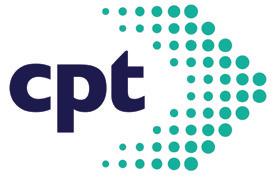
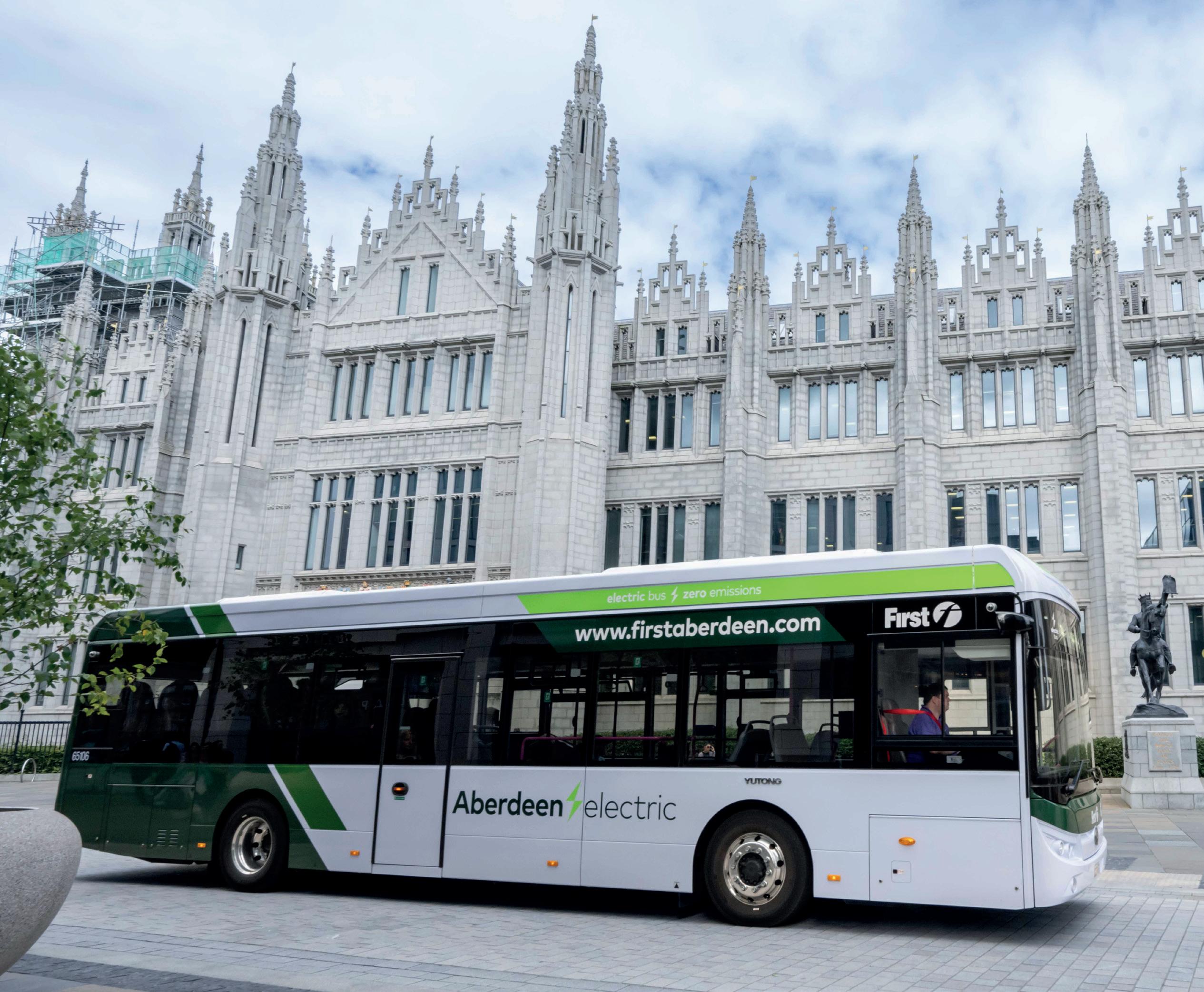
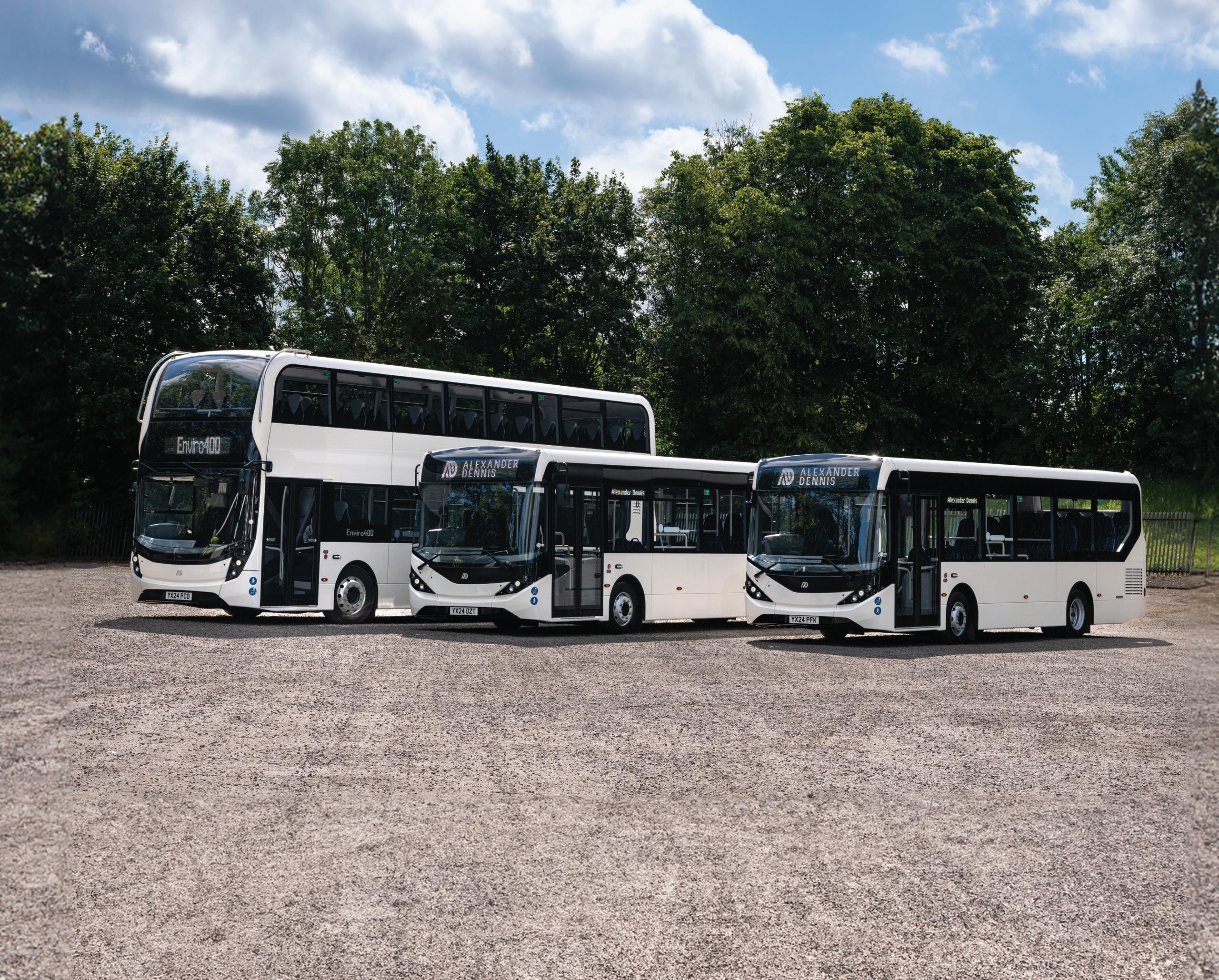


Britain’s favourite low-emission buses are ready to boost your fleet with stock available directly from Alexander Dennis.
Enviro200 single deckers in 8.9m, 9.7m or 10.8m length seat up to 40 passengers with or without seatbelts. Enviro400 double deckers offer 85 belted seats. All feature a wheelchair space and full PSV Accessibility Regulations compliance.
Some vehicles available immediately with further stock completed throughout the coming months.
Contact your Alexander Dennis regional sales manager today for full specifications and to reserve your buses!
alexander-dennis.com
Welcome to Scotland’s Buses 2024. Tis
special publication from Passenger Transport, a collaborative efort with Scotland’s bus and coach industry and its partners, highlights their achievements and considers the challenges they face. Published in association with CPT for a seventh time, this year’s edition incorporates the ofcial Conference Workbook for the 46th annual CPT Annual Conference, which takes place at the Glasgow Hilton Hotel on September 9-10
Minister for Connectivity sees a bright future for buses in Scotland

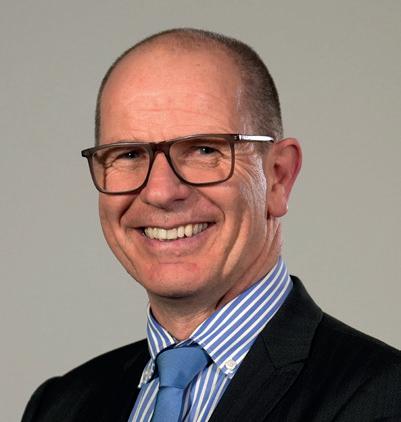
Chair of CPT Scotland says we need to get our priorities right
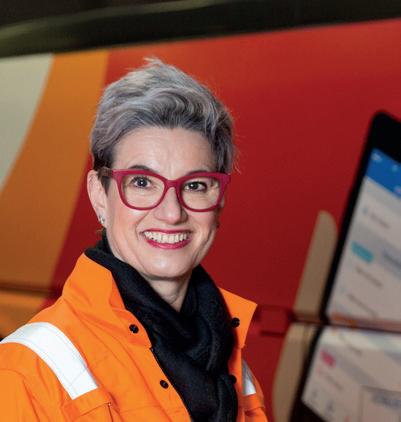
12 4 6 8 14 16 19 20 23
Control360 is
CPT scheme provides recognised assurance for coach operators

Sarah Boyd explains her formula for taking the business forwards
Ralph Roberts warns that politicking is behind the push for bus franchising
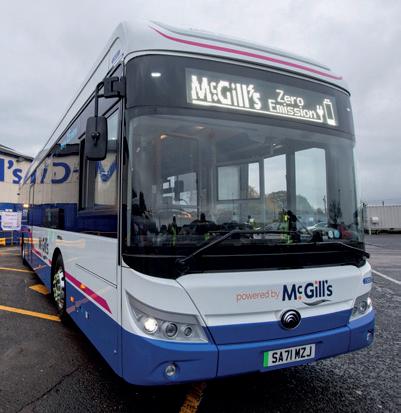
Transport Focus ofers a new benchmark for bus passenger
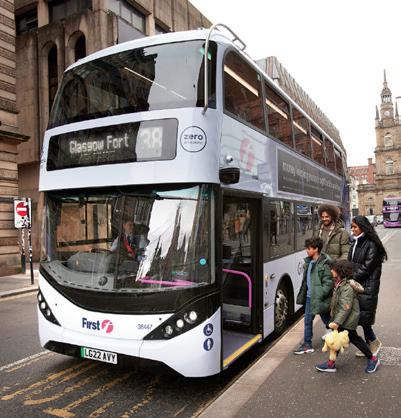
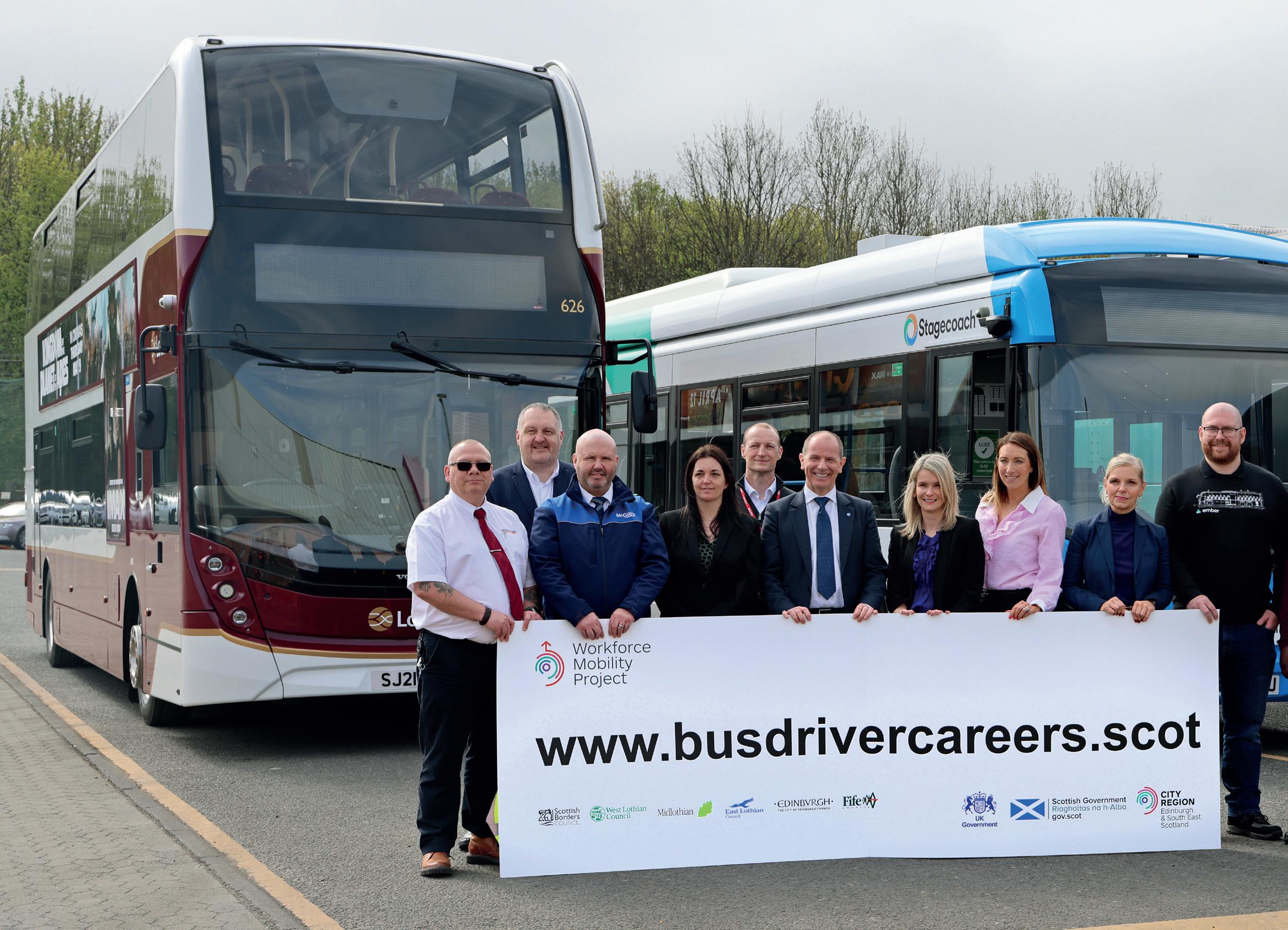
t’s great to see the CPT Scottish Conference grow from strength to strength and I’m pleased to be speaking at the Conference this year as Minister for Connectivity - with a responsibility for bus in Scotland alongside the Cabinet Secretary for Transport Fiona Hyslop MSP. We know we’re living in a global climate emergency. We know that here in Scotland transport remains our largest
carbon emitting sector - but we know too that we already have the tools to tackle some of our most complex problems. Whether it’s reducing emissions, tackling congestion, challenging transport poverty, improving air qualitythe answer is simple. Bus is best!
With more public transport trips undertaken by bus in Scotland than any other mode, buses are simply the best way to keep our country moving in a way that is healthier, happier and more sustainable - and importantly, in a
way which is accessible to many.
Each full bus can remove up to 75 cars that would have been required for single-occupancy car trips. For that reason, choosing bus today and leaving the car at home is already a climate positive choice - and when that bus becomes electric, the benefts are even greater.
For that reason, as part of our long term vision for public transport, outlined in our National Transport Strategy - bus decarbonisation has been a really
important strand of work for the Scottish Government.
£41.7m grant funding will support eight operators, led by electric vehicle feet specialist Zenobē, to deliver over 250 zero emission buses along with a Scotland-wide charging network for use by all buses, coaches and HGVs.
Te investment brings together businesses from across the bus, energy and fnancial sectors, and builds upon £113m the Scottish Government has already invested
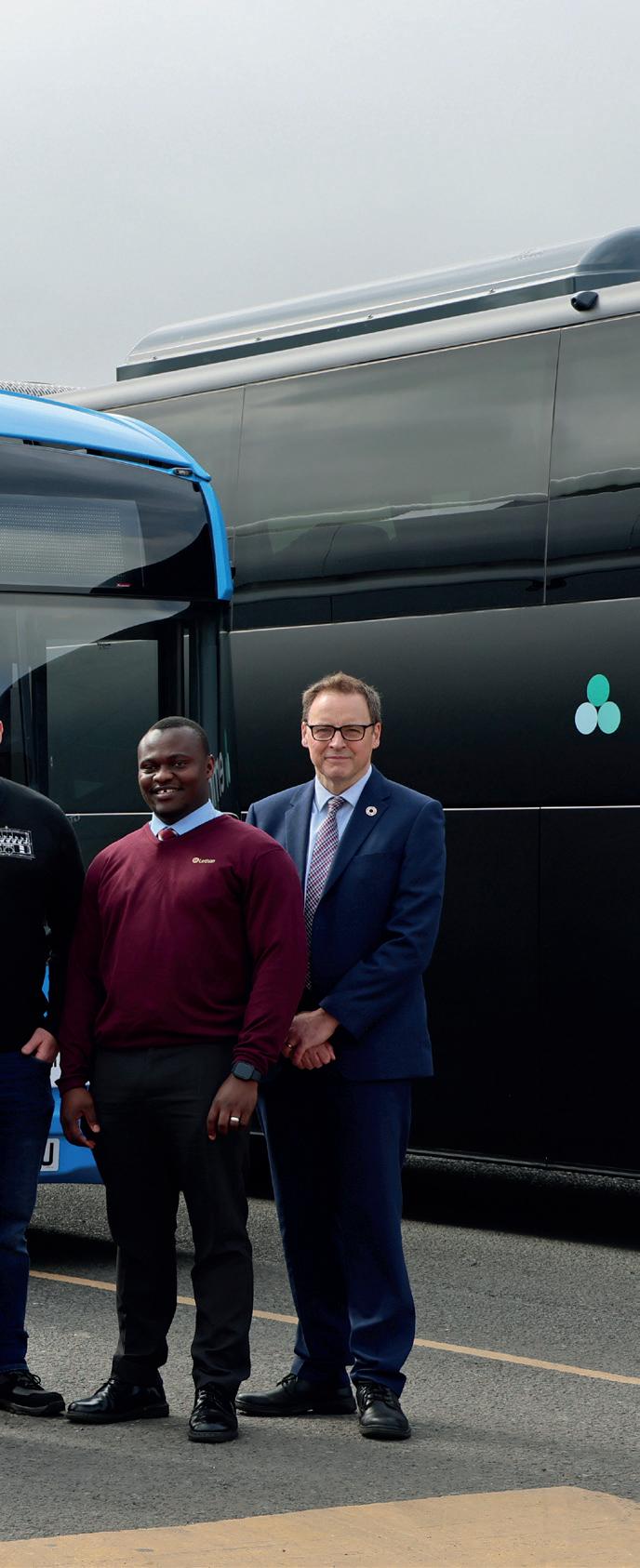
in zero emission buses and supporting infrastructure.
Critically important during this challenging fnancial period, every £1 invested from the Scottish Government will leverage a further £3.20 of private sector investment - demonstrating that our shared decarbonisation goals can be met by working together when it comes to removing carbon emissions from our bus and coach feets.
We’ve made that investment because the Scottish Government has never lost sight of the fact that bus can be our greatest ally in our fair and just transition to net zerodelivering on a range of outcomes from the environmental to the economic, from social equality and to improved public health.
It’s this same understanding which guided our actions when the COVID-19 pandemic threatened the industry and signifcant investment was
“I believe that it is vital that local transport authorities have the flexibility to respond to local challenges as they see fit”
provided to support bus services.
It’s also why we continue to invest over £2bn annually to support public transport, including providing almost 2.3 million people in Scotland with access to free bus travel - the most generous concessionary travel ofer across the entirety of the UK.
Many of you will have seen the recent announcement that we’ve now reached the milestone of over 150 million free journeys having been made by people under the age of 22 since our transformational policy was introduced in 2022. Tis is a game-changer - helping to sustain bus services, while connecting a new generation, keen to take climate action, with the many benefts of bus travel. In our recently published Programme for Government - we reafrmed our commitment to this scheme and we committed to continue to work with local authorities to promote uptake and ensure as many young people as possible can beneft from the bus ofer that CPT members provide. I know many operators have been working to promote these scheme alongside the Scottish Government and I’m grateful for that continued support - even when there has been challenges with anti-social behaviour from a small minority.
I want to be clear that any abuse of frontline public transport staf is completely unacceptable and will not be tolerated. Everyone working or using public transport has an absolute right to go about their business without fear of abuse. We are continuing discussions with unions, operators and CPT Scotland regarding the introduction of further measures to ensure the safety of everyone on our transport system. We all know that the vast majority of
young people are responsible and simply want to get from A to B - so I’m looking forward to continuing to work with CPT and its members to ensure we make the right decisions for staf and for passengers.
Tis spirit of collaboration extends also to local authorities who have the responsibility to ensure people have available and accessible public transport regardless of where they live.
We’ve now delivered all the new powers through the Transport (Scotland) Act 2019 to enable local transport authorities to consider all the powers available to them, including partnership working, franchising and local authority run services which sit alongside their ability to subsidise services. I believe that it is vital that local transport authorities have the fexibility to respond to local challenges as they see ft. CPT Scotland members will be aware that we’re beginning to see some local authorities and regional transport partnerships start to exploring those options here in Scotland.
Tis is not to diminish or take away from the incredible work and commitment by Scottish based bus operators to connect communities, transition to net zero and support
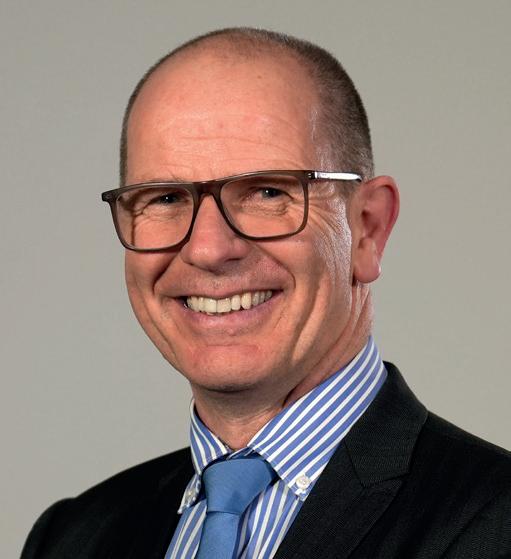
“Keeping the country moving offers an unparalleled sense of purpose. There are acts of kindness seen everyday in every part of the country”
bus uptake - including helping to promote the concessionary travel ofer, alongside making bus use easier through improved digital ofers in recent years.
Tere is a real shared desire between government and industry to achieve collective goals. A good example of this was through Scotland’s Bus Decarbonisation Taskforce.
By coming together and generating innovative ideas around bus fnancing resulted in our ScotZEB programme - and it’s showing how we can rapidly accelerate what might otherwise be possible when contrasted to a typical subsidy model.
We have and we will continue to support and be behind bus operators. To help operators comply with Scotland’s Low Emission Zones £24 million has been awarded by the Scottish Government through our Bus Emission Abatement Retroft Programme. Tis has enabled over 1,100 midlife buses and coaches to be retroftted to the Euro 6 standard since LEZs were announced. Our Network Support Grant is working to keep bus networks more extensive and fares lower than would otherwise be the case - and we also fund local authorities who also invest to support services.
For all these reasons - I believe the future of the industry here in Scotland is incredibly bright. I also believe it’s a fantastic industry for people to consider working in - and I’m really pleased I’ve been able to come along and support some recruitment events since I came into post.
Keeping the country moving ofers an unparalleled sense of purpose. Tere are acts of kindness seen everyday in every part of the country. It’s a diverse sector with cutting edge innovation - with opportunities for people to develop green skills and lifelong careers which contribute in so many ways to the beneft of our society. I want to ofer my thanks to everyone involved in Scotland’s bus and coach sector. Together, with CPT Scotland and all their members, let’s continue to work together to encourage people to leave the car at home and to choose more sustainable public transport.
“We need to get our priorities right and move at pace to deliver for our customers” says the Chair of
As Scottish Chair of Confederation of Public Transport (CPT) and also serving as the Managing Director of Stagecoach West Scotland and our UK Service Centre, I cannot overlook the signifcant changes that have taken place within the bus and coach industry, and the country as a whole, during this last year. I am aware of the challenges that both operators and business owners face.
However, this juncture brings about an excellent opportunity to work in partnership to navigate through the complexities, and emerge stronger as we head into our 2024 Scotland conference to deliver exceptional service to our customers.
At last year’s CPT conference, our focus was on ensuring government funding streams like the Bus Partnership Fund were allocated quickly and efectively. However, the current fnancial environment has become more restrictive, impacting the ability of the government and local authorities to support public transport services by investing in much-needed infrastructure upgrades. Progress is slow, coupled with the recent ‘pause’ of the Bus Partnership Fund.
In addition to fnancial issues, we continue to face challenges such as rising operational costs, labour shortages, lengthy training requirements, ambitious decarbonisation targets, fewer customers who remain impacted by changing work and retail patterns, and, most importantly, growing car use and congestion
on our roads. None of these challenges helps our customers of today or our ability to attract customers of the future.
Tese issues will be commonplace across our respective organisations. However, it is important to remember that our customers and the communities in which we operate are the foundation of our work. As service-oriented companies, it is imperative to prioritise our customers’ needs and expectations at all times.
Our clear focus can be achieved through efective collaboration and partnerships. It’s vital that we come together to defne a vision and establish realistic, achievable priorities. Investment and government support will be required to enable us to achieve our goals. In the current fnancial climate, where new funding streams are likely to be scarce and existing schemes are at risk, we must prioritise where support can be utilised most impactfully.
It’s crucial that we move forward together with urgency. Te upcoming CPT Scotland Conference will provide a forum for discussion on these topics.
My company is navigating through a transformation
“75% of public transport trips in Scotland are by bus, with over 350 million bus journeys taken across Scotland annually”
period compounded by reduced government funding. As the Scottish Government reviews its spending, it remains to be seen whether our transportation sector will experience additional impacts, particularly with regard to variations in concessionary travel and other transport subsidies. We await the national implications of the Chancellor’s Autumn Budget on October 30, which may also afect our business operations and, ultimately, our valuable clientele.
We must also be mindful of the Transport (Scotland) Act 2019 and the forthcoming publication of regulations for franchising and partnerships. Local authorities have the right to consider the regulatory framework, and we do not shy away from those discussions. However, we cannot let regulation become the focus to the detriment of work to improve bus services.
Five years on from the publication of the Transport (Scotland) Act, the powers required to implement it are still not fully in place and any franchising operation will be expensive and take at least fve years to come into operation. Tis makes business planning difcult but we need to continue to maximise what we do have, be agile and focus on the future.
Within the next couple of weeks, we will have further details of the new First Minister’s Programme for Government, the vision that will underpin the direction of policy in the run-up to the 2026 Scottish Elections. Will sustainable and active travel feature? Will the role that bus and
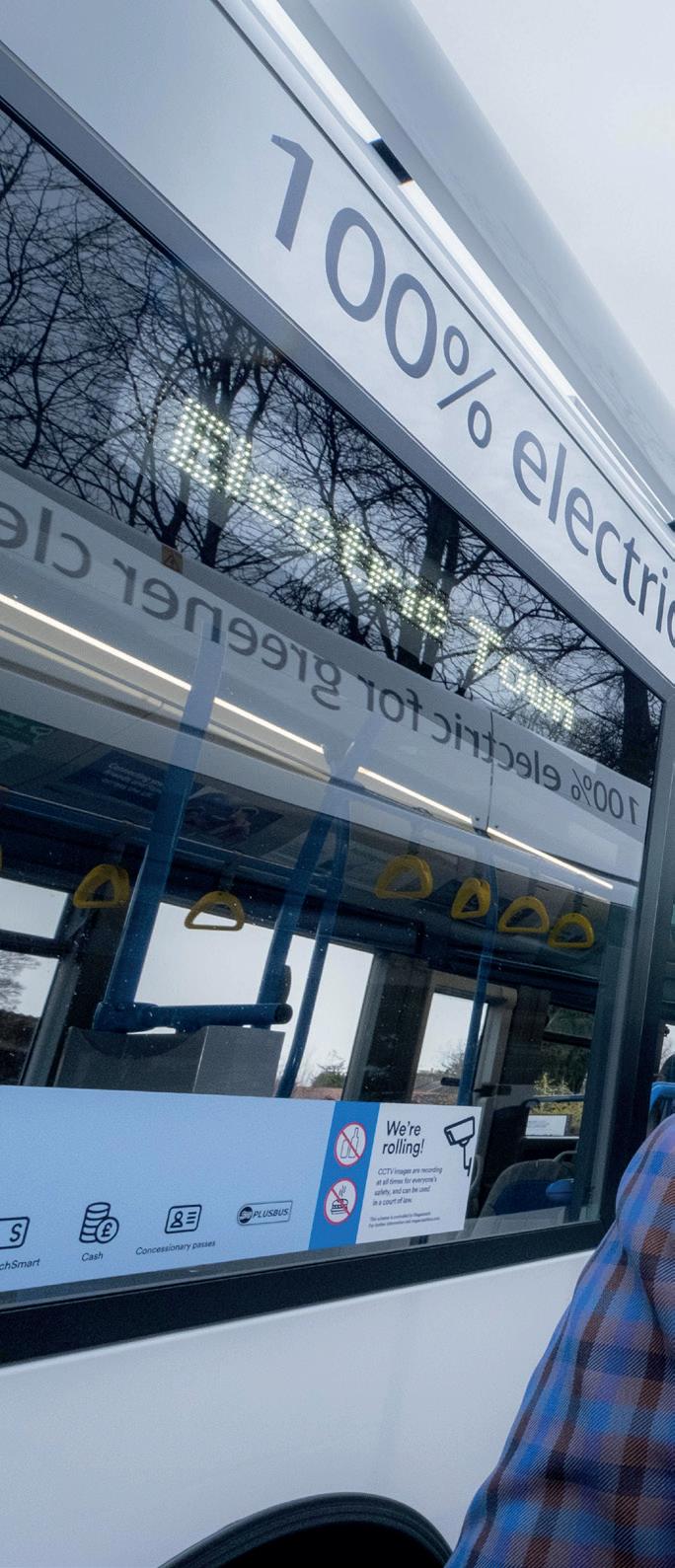
coach can play across a range of likely policy goals be recognised?
At Stagecoach, we have experienced rapid change and signifcant capital investment as we execute our strategic plan across the UK. We have taken swif action by investing in our people, infrastructure, and feet to provide a sustainable and reliable service to both urban and rural customers despite the unique challenges presented by the diverse Scottish landscape and the difering priorities of our communities. As part of our sustainability eforts, we are transitioning our feet to electric vehicles (EVs) with the support of various funding sources, including ScotZEB, and our own fnancial commitment. We are currently operating 142 EV buses across Scotland, and, within the next six months, we anticipate adding 98 to our feet, each uniquely tailored to suit the routes they serve.
Te pace of progress has been greatly facilitated by the
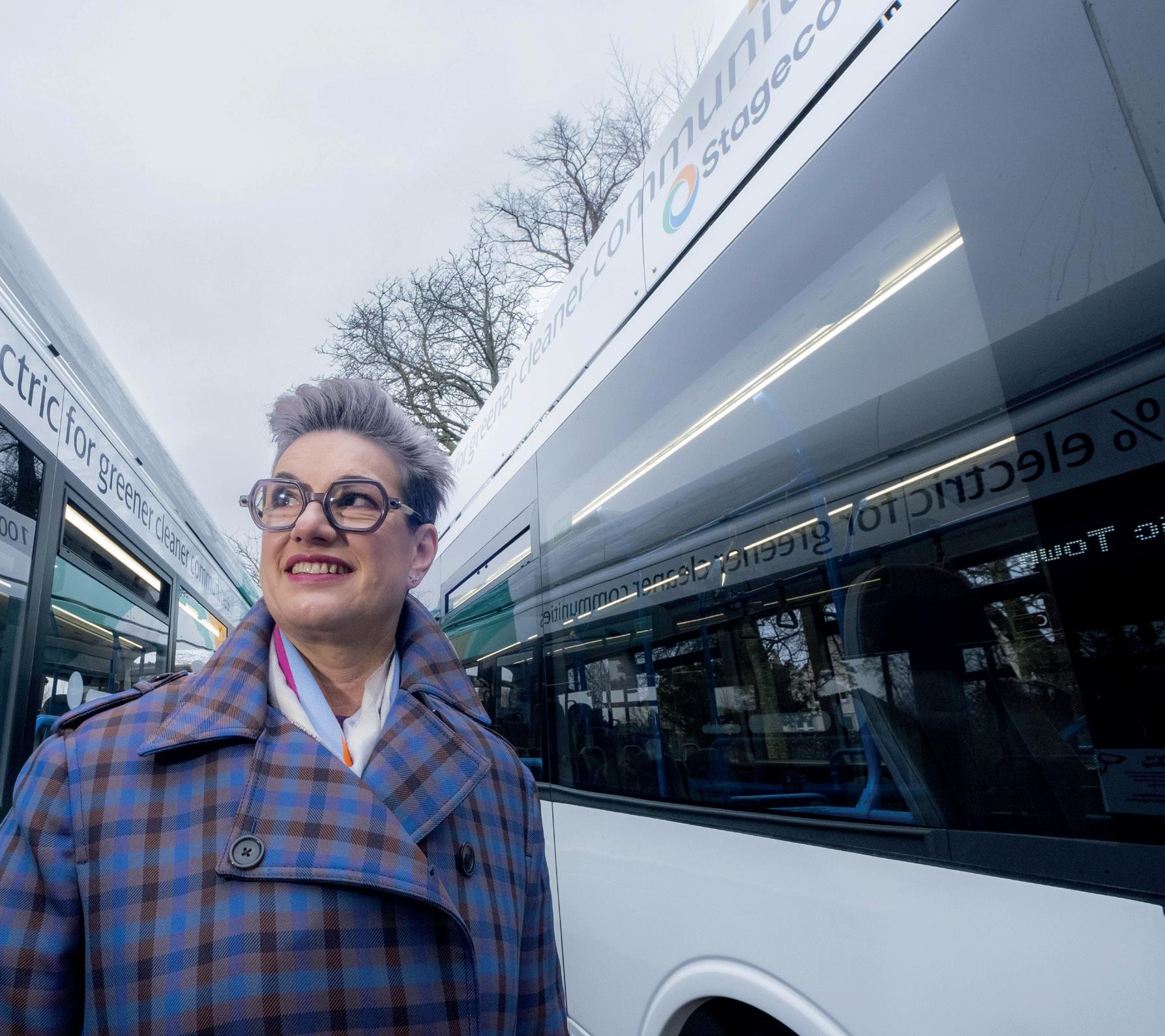
funding assistance provided by Transport Scotland and other valuable partners. It is, however, imperative to secure additional sources of funding to augment this already impressive momentum.
Stagecoach West Scotland’s commitment to sustainability and innovation is evident in an over £42m investment since 2021. Tis investment has been instrumental in establishing the necessary infrastructure in three of our depots and deploying a feet of 92 electric buses to serve various communities. Kilmarnock is on track to be the frst fully electric town in the UK, and Inverness is the frst fully electric city. I will participate in the upcoming conference’s panel discussion on prioritising partnerships. I hope to address the pausing of the Bus Partnership Fund (BPF). Te BPF's aim was to improve bus priority infrastructure and promote collaborative work. However, the Fund has been put on hold, and
only a minimal portion of the £500m budget has been allocated. Considering this, what are some efective strategies to sustain building valuable partnerships?
75% of public transport trips in Scotland are by bus, with over 350 million bus journeys taken across Scotland annually. Tere is a pressing need to reduce travel times through bus priority infrastructure and address consistency issues to improve the customer experience further. Our customer surveys indicate that journey times and service reliability are among the primary concerns of our passengers. While we strive to address these concerns, infrastructure improvements and complementary policies at both local and national levels are crucial to achieving optimal results. Tus, we urge our government partners to work with us to improve buses and grow usage to see the subsequent benefts in critical areas such as air quality and
customers a multi-operator ticket that allows passengers to use one ticket across multiple bus operators, simplifying the customer experience. We take our responsibility for customer safety seriously and are determined to ensure the safety and welfare of both our customers and our drivers, who play a critical part in delivering the GBA’s services.
CPT is the trade association for both the bus and coach sectors. Many operators, including Stagecoach, run both bus and coach services. With my coach hat on, I believe that priority infrastructure, coach parking and accessibility are critical to support our valuable tourism industry in Scotland. Tat’s why it’s essential that local authorities ensure that there are high quality facilities, parking and access for coaches across cities and towns in Scotland. Tis is not just about delivering exceptional service, but also about meeting the increasing demand for coach travel and ensuring that our customers have a comfortable and stress-free travel experience. Coach tourism should be a priority and not an aferthought in city mobility plans.
“Scotland’s Net Zero targets are ambitious, but can we convince more individuals to switch from cars to buses?”
accessibility.
As the Chair for the Glasgow Bus Alliance (GBA), I take pride in leading a collaborative partnership of operators based in and around Greater Glasgow. Our goal is to reinvigorate bus travel in our city region through the delivery of greener, safer, and seamless services that cater to the needs of our growing population. Given this objective, we’ve invested in zero-emission vehicles to ensure that many of Glasgow’s population experience the benefts of reliable and sustainable public transport. Te introduction of ‘Tripper’ ofers
Scotland’s Net Zero targets are ambitious, but can we convince more individuals to switch from cars to buses? To make substantial progress towards these targets, it is critical to emphasise the convenience, punctuality, security and reliability of bus travel, while also highlighting its capacity for connectivity. Buses can play a vital role in reducing carbon emissions from transportation, so let’s work together to encourage their use. People moving away from their car onto bus is the quickest and most cost-efective way to reduce road-transport carbon emissions.
We should also seek input from stakeholders. By engaging in open communication and sharing best practice, we can shape a more sustainable and innovative future for our customers, employees and businesses.
Let’s use this opportunity to build strong partnerships and drive positive change, but can we do it fast enough?
Tere is much to discuss, so let’s make a start at the conference and move this all forward, at pace, together.
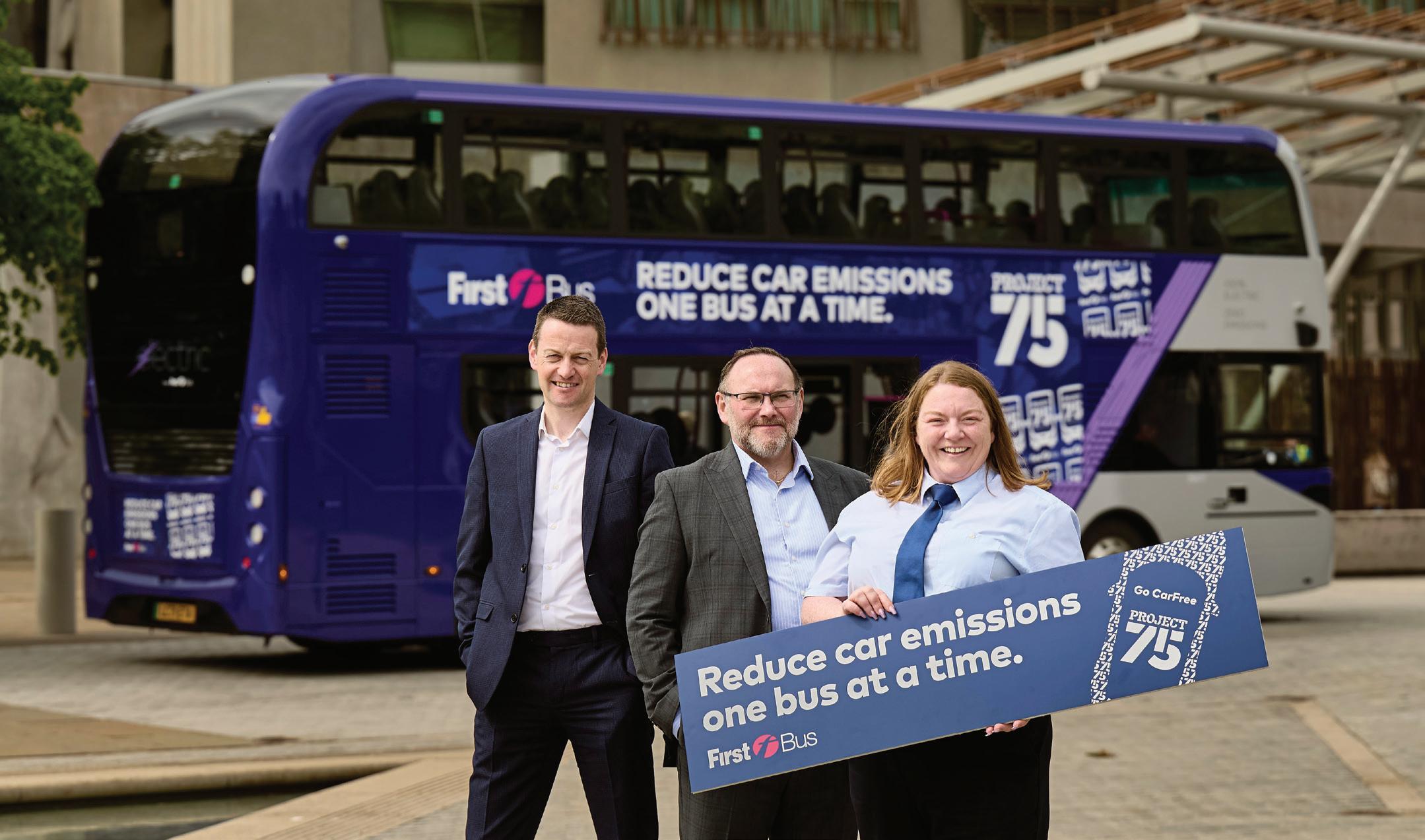
SEPTEMBER
‘We will stand frm, if you stand frm’Hyslop
Speaking at last year’s CPT Scotland Conference in Glasgow, transport minister Fiona Hyslop said the Scottish Government had no intention to follow the lead of then prime minister Rishi Sunak in constraining policies that seek to reduce car journeys in favour of sustainable transport. Instead, she saw an opportunity to “steal a march” on her colleagues south of the border
Inspired by the Conservative victory in the Uxbridge by-election, a result that was linked to London’s ULEZ scheme, Sunak’s government had published a ‘Plan for Drivers’
that limited the powers of local authorities to prioritise buses.
CPT Scotland director Paul White asked Hyslop whether this makes it harder to sell pro-bus policies to Scottish voters or whether it was an opportunity to get ahead.
“I think it’s an opportunity to steal a march,” she responded. “I strongly believe that transport is about people and places, rather than the vehicles ... I think if we sell that message more, I think we will take people with us on this journey.
Hyslop expressed optimism that the political consensus on sustainable transport will not fracture in Scotland, and said that measures like bus lanes and bus gates are needed to make buses a reliable alternative to using cars.
“We all have a job to do to sell that,” she said. “We will stand frm if you stand frm.”
Formally launched in November 2020, Scotland’s Bus Partnership Fund was hailed as a “landmark long-term capital investment of over £500m for bus priority measures”. But with the Scottish Government having “no plans” to make money available to the fund in the next fnancial year, and only £26.9m awarded to date, CPT Scotland wrote to Scotland’s minister for transport, Fiona Hyslop, to seek assurances.
“Te Bus Partnership Fund was a landmark announcement, demonstrating the Scottish Government’s commitment to
supporting bus and growing bus use,” said CPT Scotland director Paul White. “It could still be the catalyst for partnerships across Scotland, facilitating bus priority projects that deliver social and economic benefts, as well as contributing to wider government objectives.
“Over the past four years, operators and authorities have invested heavily in developing fund bids, 17 of which are ready to commence. To pause the fund at this stage, is counter to the government’s National Transport Strategy priorities and leaves partnerships across the country in limbo, to say nothing of the impact on bus users.
“CPT will continue to press the Scottish Government to reconsider this decision, or to set out how partnerships continue
productively through this fnancial year in the absence of any national funding support.”
Strathclyde could become the frst region in Scotland to franchise its bus network afer Strathclyde Partnership for Transport (SPT) members approved plans for a consultation about the future of buses. It could shake up a bus network that takes in a broad swathe of the west of Scotland and includes Argyll and Bute, Glasgow, Inverclyde, Ayrshire and Lanarkshire.
In a report to partnership members, Bruce Kiloh, SPT’s head of policy and planning, said the organisation’s work in developing the new Regional Transport Strategy had reafrmed signifcant concerns in terms of the efciency, performance, afordability and overall sustainability of the bus network in Strathclyde.
Bus that highlighted how a single double decker bus can remove up to 75 cars from the road.
Te move followed the controversial decision by the Scottish Government to pause its Bus Partnership Fund scheme earlier in the year due to budgetary pressures.
Despite the setback, several notable MSPs, including Kenneth Gibson, Sue Webber, Graham Simpson, and Mark Ruskell, joined First Bus and bus industry representatives outside the Scottish Parliament to back First’s Project 75 campaign, which advocates for policies that prioritise investment in bus infrastructure, which will improve bus service reliability and incentivise modal shif
Duncan Cameron, managing director of First Bus Scotland,
commented: “We want to provide environmentally conscious, costefective travel across Scotland and by increasing dedicated road infrastructure for buses, it will not only improve punctuality and reliability of our services, it will make the bus more attractive to current and potential bus users.”

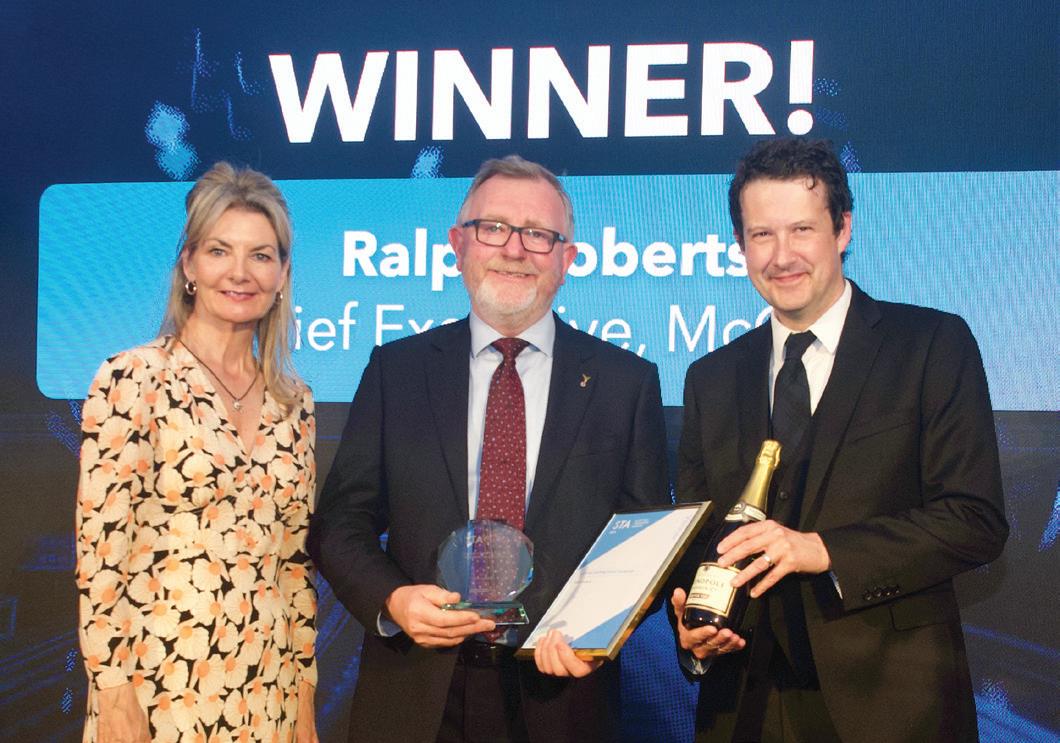
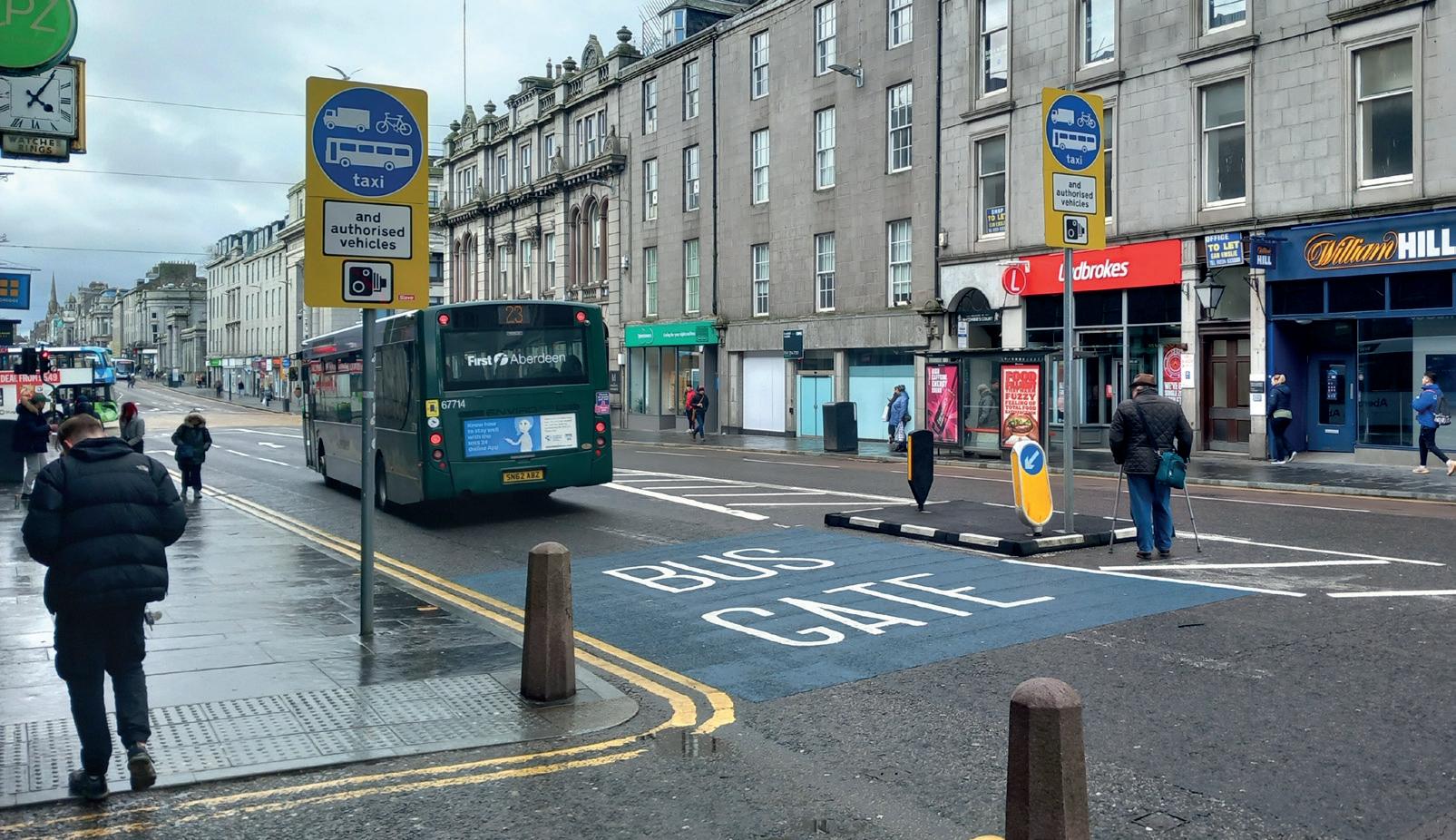
In June, Professor David Begg warned his home city of Edinburgh to future-proof its bus network against further increases in journey times or risk decline.
Begg, former Commission for Integrated Transport chair, was speaking at a meeting of the Edinburgh Bus Users Group in the Scottish capital. Te former Edinburgh councillor lamented that statistics on bus journey times are not readily accessible. However, he cited the City of Edinburgh Council’s strategic business case for funding from the Scottish Government’s “paused” £500m Bus Partnership Fund, which revealed that “bus journey times in Edinburgh continue to increase as a result of congestionby nearly 20% in the last 10 years on certain corridors”.
Begg said that the network could be future-proofed against further decline in bus speeds if the Scottish Government resumes the Bus Partnership Fund and supports Edinburgh’s “fantastic” bid for bus priority improvements on eight key transport corridors, which seeks to reduce journey times by 10% and journey time variability by 25%
“You get a cost-to-beneft ratio of 13 to 1,” he said. “Nothing compares with this. I don’t see any other project that compares with this.”
Ralph Roberts, the CEO of McGill’s Bus Group, received the Lifetime Contribution to Transport Award at the Scottish Transport Awards 2024 in Glasgow in June. Roberts, who has a 30-year background in transport, joined McGill’s in 2010. Under his leadership, the company has grown from a 140-employee operation to one that employs more than 2,000 individuals – making it the UK’s
largest independent operator. McGill’s further success came when Mohammed Ramzan of its Xplore Dundee operation was named Frontline Employee for the year.
Scottish Citylink coaches won the Public Transport Operator of the Year award. Te express coach operator has increased passenger numbers by 21% over the past year.
Aberdeen City Council won the Contribution to Sustainable Transport award for its new city centre bus priority measures, funded by the Bus Partnership Fund.
First Bus won Excellence in Travel Information and Marketing award for its Under 21s ‘Free to Explore’ campaign,
bus
Zenobe awarded £41m for Scottish expansion
Zenobe was awarded £41.7m in phase 2 of the Scottish Zero Emission Bus Challenge Fund (ScotZEB). John Swinney, the frst minister of Scotland, announced the news at an event in Dunfermline.
Zenobe, a leader in vehicle feet electrifcation and battery storage innovation, will lead a consortium of operators, providing tailored fnancing structures while also delivering key infrastructure and ongoing support for electric vehicle operation.
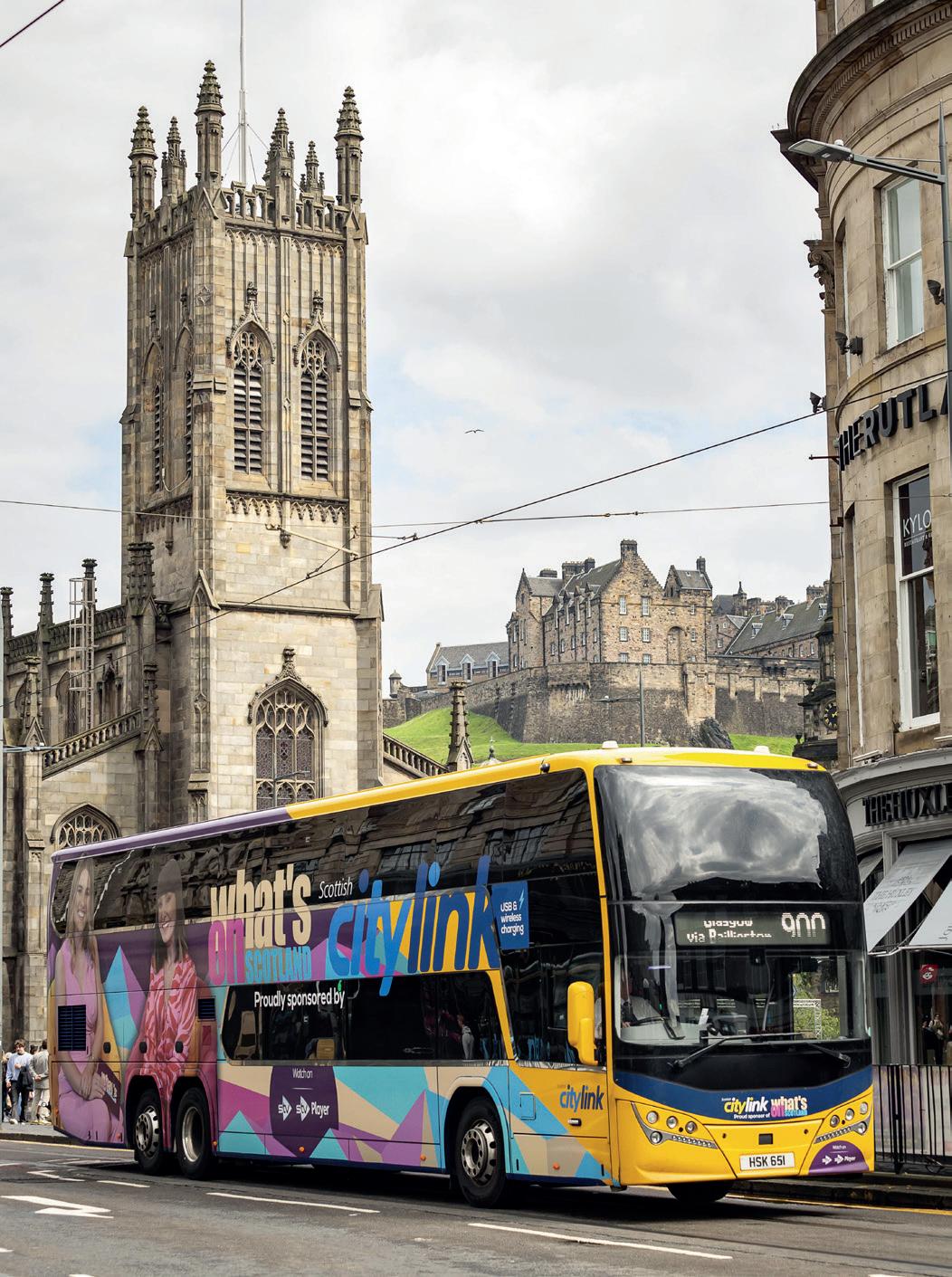
Te funding enables eight small to medium-sized enterprises and mid-market and major operators to transition their feets to zeroemission vehicles. It will add more than 250 electric buses to Scotland and expand the current number of e-buses in the nation by 40% by the end of 2026.
Te operators in the consortium include D&E Coaches, Ember, Hairy Haggis, Maynes Coaches, McGill’s, NHS GGC, Premier Coaches and

their waiting times, and timeliness was identifed as a crucial factor in determining whether a journey was satisfactory or exceptional.
“It is good to see many passengers are satisfed with their journey,” said Robert Samson, the watchdog’s senior engagement manager. “However, there is a wide variation in scores for waiting time and value for money.”
Scottish bus operator McGill’s Group announced a number of new appointments and changes to strengthen its senior leadership team in August. Ralph Roberts, the current CEO, has been appointed as the company's new chairman, taking over from coowner James Easdale. Easdale and his brother Sandy will continue to serve as directors.
Stagecoach.
John Swinney commented: “All bus and coach operators, including those operating in smaller towns and communities, will beneft from both the novel approach to fnancing and the Scotland-wide charging network that will be delivered, helping other modes of transport make the switch to electric vehicles too.”
Passenger satisfaction with bus services in Scotland stands at 86%, but improvements in punctuality and waiting times are needed, according to the frst-year results of Scotland’s Your Bus Journey survey by Transport Focus.
Published in August, the survey used feld data gathered last year and received feedback from passengers across six Regional Transport Partnership areas. Te watchdog found that 77% of passengers were satisfed with
Tony Williamson was named the new CEO of McGill’s. With nearly 40 years of experience in public transport, Williamson has held various leadership roles, 17 years as a managing director with Arriva Group.
Robbie Drummond joined McGill’s as the new fnance director and company secretary. He previously served as group fnance director for CalMac Limited.
Lothian Buses announced the appointment of Susan Deacon as chair of the bus operator’s board. Deacon took over with immediate efect from Jim McFarlane who stood down afer nine years in the role.
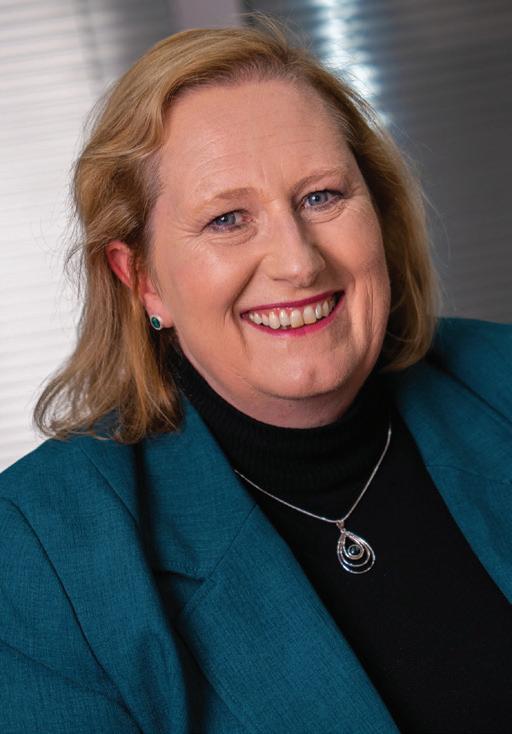


































working in partnership with the Scottish Government to reduce pollution and improve air quality group the
























































































































































































































































































PT’s Coach Friendly scheme was created in 2014 to ofer a framework within which local authorities, Business Improvement Districts, Destination Management Organisations, and a range of businesses in places such as seaside resorts, historic towns and attractions can work in partnership with the coach sector to improve facilities for coach passengers, drivers, and operators.
Coach Friendly status provides recognised assurance for coach
operators, drivers and passengers that they will be well catered for and welcomed by a place that is committed to delivering a great experience for visitors and to more sustainable tourism.
Te Coach Friendly concept is all about securing frst class experiences for passengers and drivers. Tis, in turn, drives interest and an increase in the number of coach visits. Footfall increases for the destination’s businesses and road space is freed up by encouraging more visits by groups travelling in one vehicle, rather than
“CPT believes Coach Friendly can grow further and in Scotland the scheme could deliver real benefits for both destinations and coach operators and their customers”
people
travelling separately by car.
Te scheme currently has more than 20 members across the UK and is continuing to grow in popularity as a host of cities, towns & villages, together with attractions, see the economic impact and environmental sustainability that coach travel delivers.
Destinations which have achieved CPT Coach Friendly status in the last year include: n Te city of Durham n Northallerton, North Yorkshire n Te Sill National Landscape Discovery Centre,

Northumberland National Park n Bishop Auckland, County Durham
n Taith Pyllau Glo Cymru, the Welsh Mining Experience n Aerospace Bristol - the supersonic aeronautical and space technology museum.
n Oswestry, Shropshire
Several other cities and tourist destinations have also successfully renewed their Coach Friendly accreditation this year including the Royal Mint Experience in Wales, Beamish open-air museum, Shrewsbury, and Wells in Somerset.
Perth, which became Scotland’s frst Coach Friendly location in 2015, was reaccredited earlier in 2024 to coincide with the reopening of Perth Museum, home to the historic Stone of Destiny.
Another Scottish Coach Friendly location is Inverness, frst accredited in 2016 and reaccredited in 2024. Inverness Business Improvement District manages a Coach Friendly
facility where Coach and Visitor Ambassadors welcome coach passengers from cruise ships and other coach tours.
CPT believes Coach Friendly can grow further and in Scotland the scheme could deliver real benefts for both destinations and coach operators and their customers. Tere are a plethora of tourist experiences on ofer which can work for coach groups either as “stop ofs” during scenic touring, such as whisky distilleries, or longer stays in villages, towns and cities.
Membership of Coach Friendly entitles destinations to use the CF logo in all its communications and publicity, and crucially CPT will ensure its hundreds of coach operator members are aware of what the destination ofers coach passengers.
To fnd out more about Coach Friendly & how to join, contact CPT’s UK Coach Manager at phil.smith@cpt-uk.org
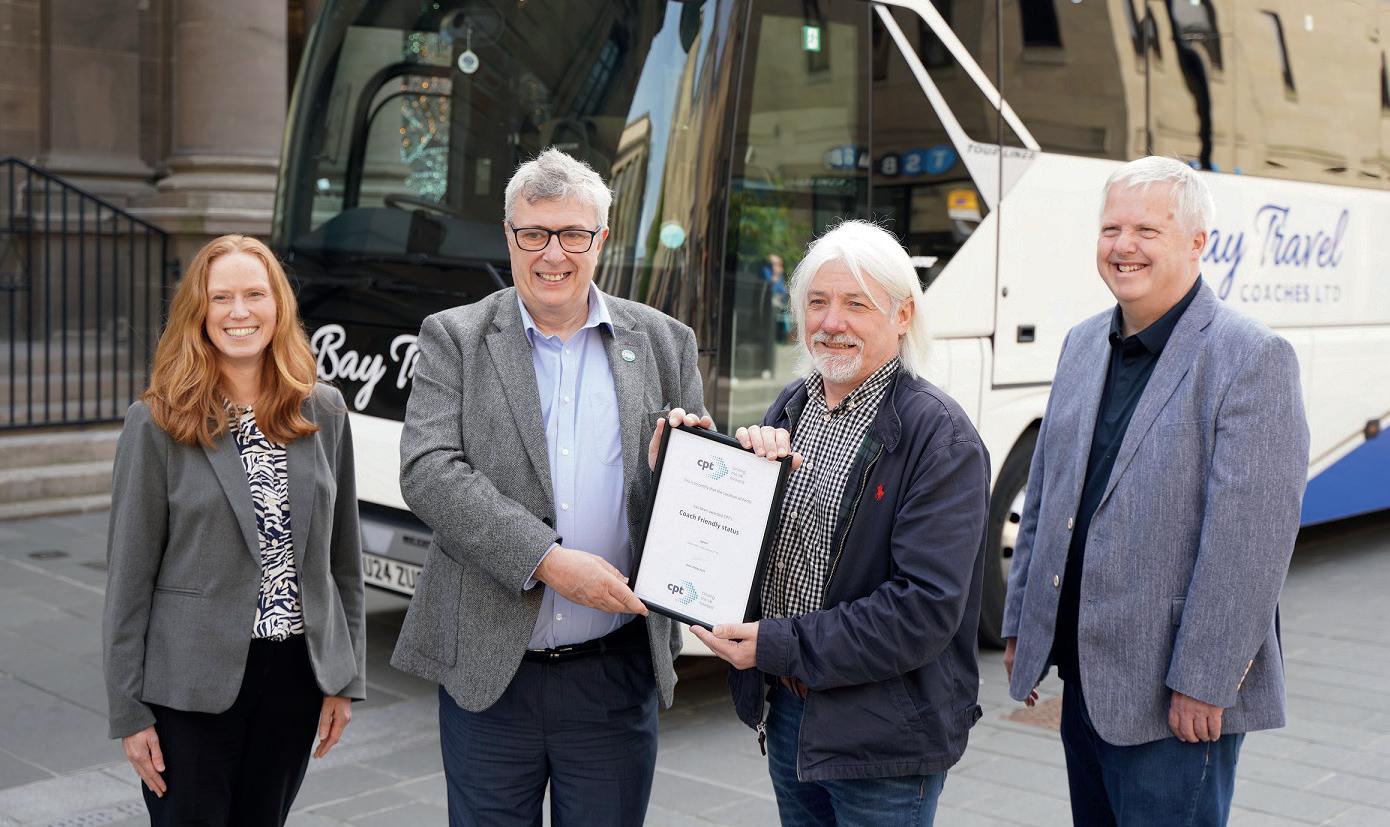
n Available and accessible advance information on drop-of points, coach parking and information for groups
n Information on tourist ofering - sites, attractions and hotels
n Clear directional instructions and signs for visiting coaches
n Special measures for access to city/town centre (use of bus lanes etc.)
n Adequate capacity for coach parking, drop of and pick up points etc
n Coach and driver facilities
n Adequate facilities for group comfort
n Facilities for passengers with mobility and accessibility requirements
n A local named representative(s) who can be contacted or on hand to deal with difculties, conficts, and complaints.
024 is shaping up to be another strong year for us at Lothian Buses. We were delighted to announce that we had delivered over 110 million customer journeys in 2023, our highest number since 2019. It was also the frst year since 2019 that Lothian was able to return a dividend to our local authority shareholders.
Lothian operates a holistic network of services with inclusivity and accessibility at the forefront of everything we do. Our services recognise elements of economic and social value, which contribute to the overall attractiveness of our network. In the past year, £4.1m of services, subsidised by Lothian, were operated for social need.
Good relationships are essential in our industry. Over the past few years, we’ve worked hard to build and maintain partnerships, and I never take for granted the strong relationships we continue to nurture with our people, our customers, and our stakeholders.
It’s those strong relationships which were the catalyst for our recovery, and which prompted our successful year in 2023. It would not have been possible to deliver for those 110 million customers who make the choice to take a journey with us on one of our vehicles without the backing of our incredible team of people.
In 2023 we undertook an Employee Survey to better understand our business from a colleague’s viewpoint. Some of highlights were as follows:
n 85% of colleagues are proud to work for Lothian;
n 95% are clear of what is expected of them in their role;
n 95% have good relationships with the people they work with;
n 83% feel they are able to be
themselves at work; n 81% feel their manager is supportive.
Tere are, of course, learnings from the results that we can take away but I’m heartened that all of the work that we are doing to drive forward and instil a ‘people frst’ culture at the business is paying of. We want to get it right for our people, to ensure they can continue to come to work happy and see Lothian as a place where they can further develop their skills into a long, fulflling career.
We strive to have a culture where we can attract and retain the very best of talent, and as one of the largest employers in Edinburgh, Lothian is a major economic contributor. At present, we have over 2,600 colleagues, some joining us for their frst step on the career ladder, others for a new chapter.
We work closely with our trade union, Unite, and in 2023 we agreed on a two-year pay deal which stabilised the business and allowed for a steady recovery. We built on this further by enhancing our employment ofering by introducing healthcare benefts, pension salary sacrifce, a cycleto-work scheme, and improved driver duties and rotas. We have
also just achieved accreditation as a Living Wage Employer, which was a particularly important milestone for us.
I’m a frm believer in getting it right on the inside in order to get it right on the outside, and I challenge the team on a daily basis to ensure that we continue to evolve our thinking in how we can make Lothian the best possible place to work.
It’s a great privilege to lead Lothian, however, none of the highlights and successes would be possible without every single person across the business working together to deliver them.
Our 2024 Business Plan, ‘Getting it right for our people
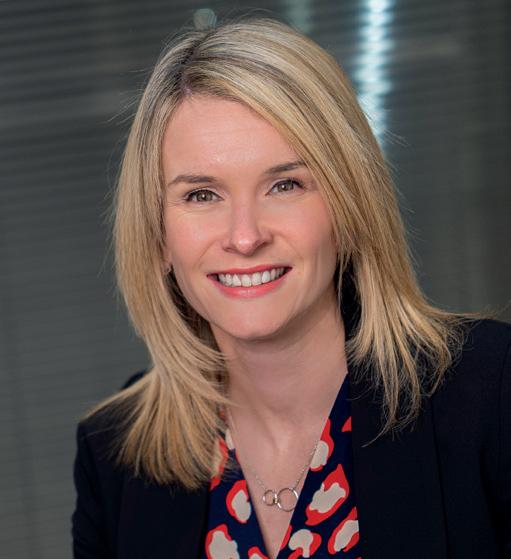
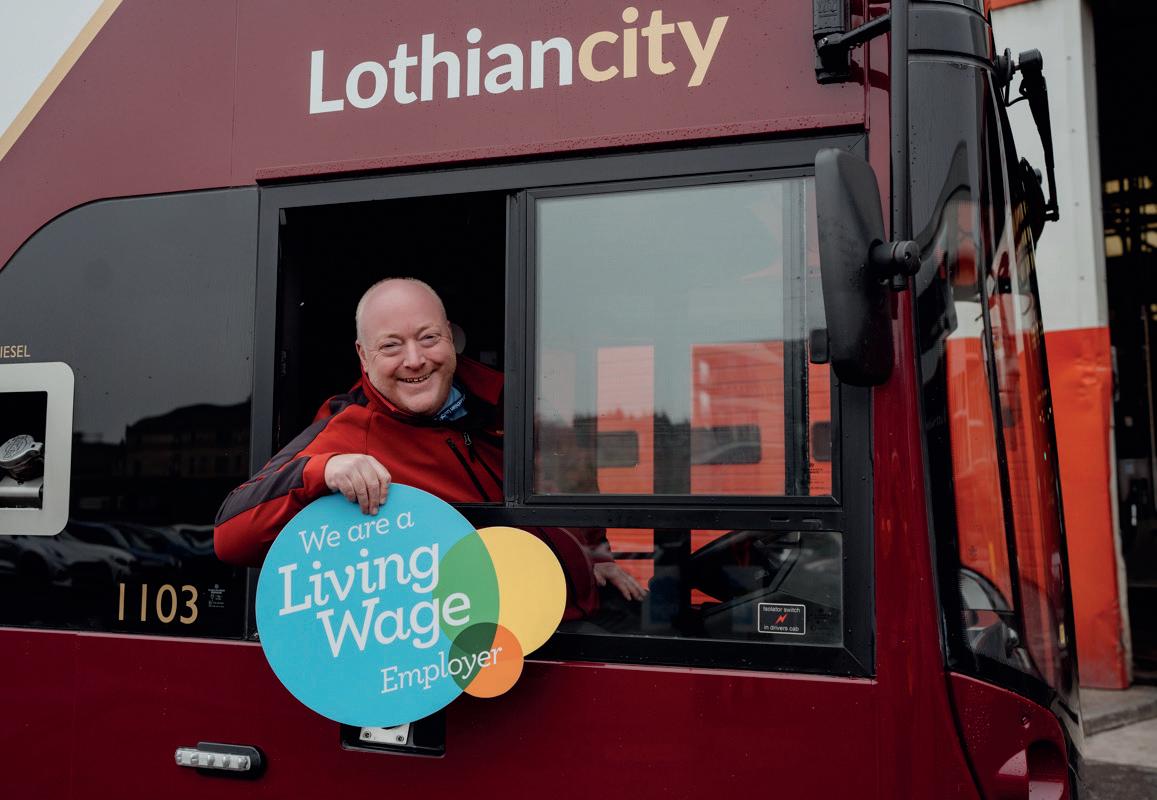
and our customers’, provides a robust platform for Lothian’s continued success through the next few years. It is a shared vision for the future that our people can buy into and contribute to. I think it’s really important, as a business, that we discuss openly what we are trying to achieve and why.
As a publicly-owned company, sound working relationships with our external stakeholders are also crucial to the business. We work closely with the City of Edinburgh Council, East Lothian Council, West Lothian Council, and Midlothian Council to maximise our delivery of safe, reliable and sustainable public transport in each area within our network.
We strive to build strong relationships and share our expertise with others for the beneft of our customers across Edinburgh and the Lothians. For example, this year, Taylor Swif was much-anticipated to arrive in the city for her record-breaking concerts at Murrayfeld. Heralded the biggest-ever gig in Scotland, with over 70,000 people attending each of her three concerts, it was a fascinatingly exciting weekend for everyone in Edinburgh. For Lothian it was a huge operational challenge for our teams, with many concert-goers using our special services to get to and from the event. We also had our existing network to operate in addition to these special services.
Tanks to strong partnerships with the City of Edinburgh Council, Police Scotland and the Scottish Rugby Union at Murrayfeld, Lothian enjoyed an immensely successful weekend, and we were able to move as many people as possible across the three nights. Tat’s why multi-agency collaboration is so important. When working together, we can present our capital city in a good light.
Within our partnerships, I think there is a shared belief that what is good for Lothian is good for Edinburgh and vice-versa. Of course, it’s not all concerts and special events. Strong working relationships are crucial for us to continue to deliver for our customers. We continue to work closely with key stakeholders to combat anti-social behaviour. We operate a robust, zero-tolerance
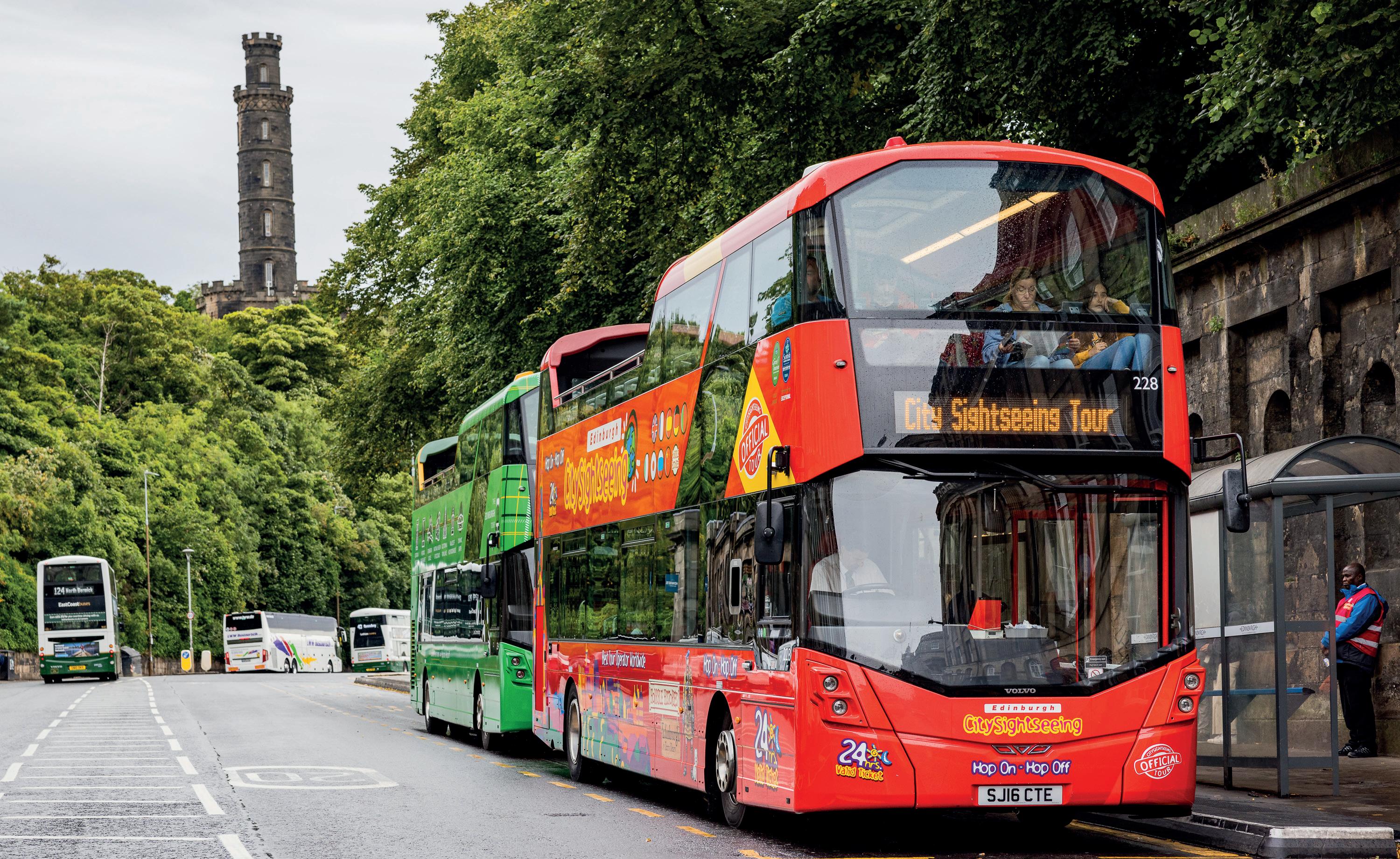
approach to anti-social behaviour and over the last few years we have not hesitated to withdraw services in areas worst afected.
I’m delighted to be able to speak about Lothian’s continued growth into 2024 and beyond. Tis year, we completed the acquisition of Eve Coaches in Dunbar, to give us a greater presence in East Lothian and add to our coaching operations. Eve Coaches is an excellent addition to our group and will allow us to build on what we have already established in East Lothian.
Lothian makes a huge contribution towards the local economies of Edinburgh and the Lothians. We are very much part of the fabric of Edinburgh and have been for over 100 years. Our buses are part of the city’s identity, and our trusted brand is considered a part of everyday life.
Although we are a local bus company, it is staggering to think of how our operating network has expanded over the 105 years we have been in operation. We operate a comprehensive network, connecting communities and providing essential transport links from Whitburn in West Lothian and all the way to Dunbar
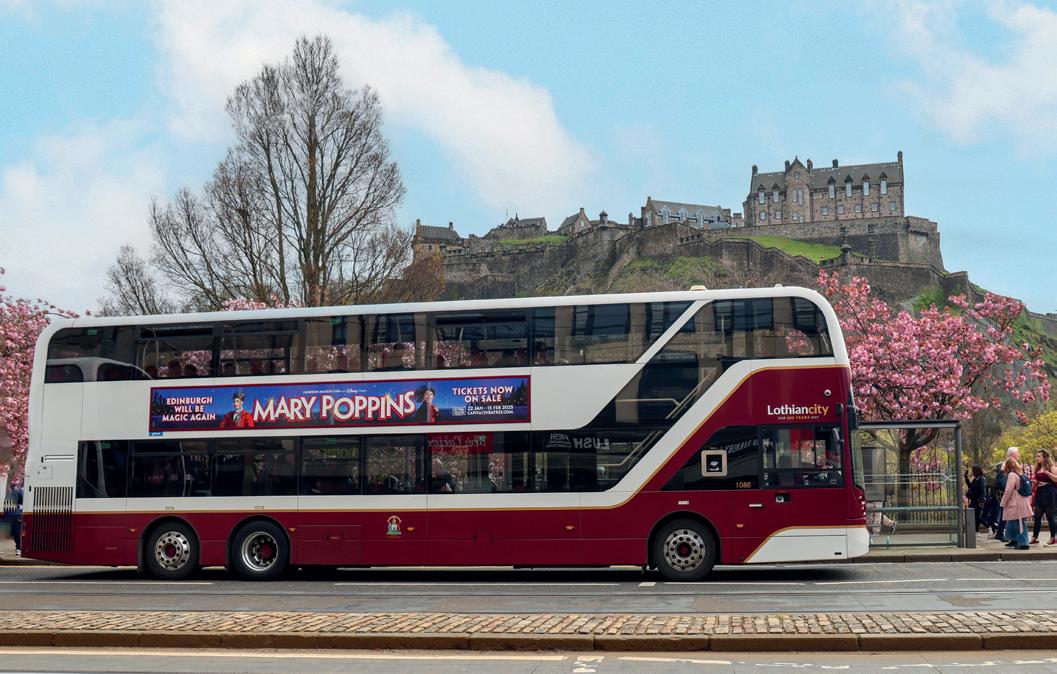
“I’m a firm believer in getting it right on the inside in order to get it right on the outside”
in East Lothian.
I am delighted that our Edinburgh Bus Tours operation retained its status as a coveted fve-star Visit Scotland tourist attraction. It is also Scotland’s third most popular, paid-for visitor attraction and our CitySightseeing Edinburgh Tour was recognised
as CitySightseeing Worldwide’s Global Operator of the Year. Our tour portfolio captures all the city’s most famous landmarks and provides the perfect snapshot of the capital which tourists return to year afer year.
We are proud to be at the heart of the communities we serve, 24 hours a day, 365 days a year. I sit in the enviable position of being able to lead a robust corporate and social responsibility agenda, which can be a platform for us to infuence real and positive change for our customers.
Tat’s why working closely with our key stakeholders is more
important than it ever was. We have embarked on an exciting journey at Lothian as we take steps to decarbonise our feet and provide zero-emission bus travel by 2035. Our journey to net zero will signal a step-change in how we operate, and we know that we must collaborate with stakeholders to ensure the correct infrastructure is in place for us to succeed.
I will continue to advocate for more incentives within our network to make travelling by public transport as attractive as possible. Bus priority is vital in our commitment to drive modal shif and deliver a safe, reliable and sustainable public transport network for our customers, removing social barriers for as many as possible.
Te next decade or so will be crucial to the success of public transport in Scotland. I look forward to working with our stakeholders and partners as we continue to deliver safe, reliable and sustainable bus services for the people of Edinburgh and the Lothians. We will lead by example to maximise opportunities to deliver joint solutions with our partners and drive modal shif
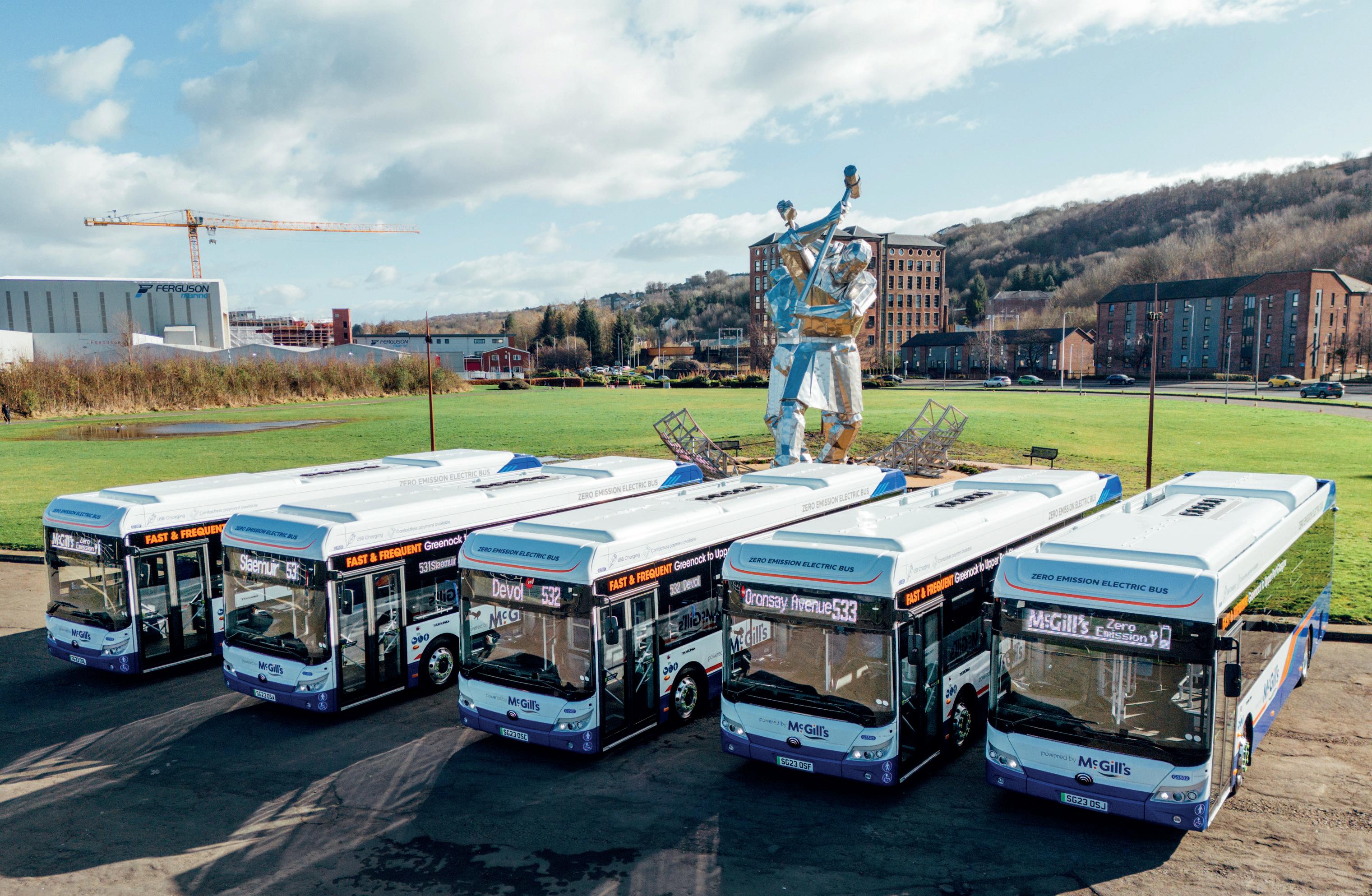
If the recent Transport Focus passenger survey results are anything to go by, buses in Strathclyde are in good shape. How does this information tally with the claims that “the bus network [in Glasgow] is broken” and that “franchising is the only game in town”? To me, it all sounds rather like electioneering or dodgy ideology... at best. Most sensible people agree that it is a sledgehammer to crack a nut.
Tere is absolutely no doubt that politicking is at the heart of the current efort to confscate private bus operators of their years of investment. From local authority meetings where there
is an unnatural focus on bus operators rather than bus users and the system as a whole, to prolifc politicians such as Andy Burnham or Paul Sweeney, with their one-size-fts-all dogma. If it really is one-size-fts-all then I’m sure that SPT would welcome a doubling of their budget to get to Transport for Greater Manchester levels - and have it back dated for 20 years for good measure!
I was recently asked what I thought of the Manchester Mayor’s comments that Glasgow should “go for it”. My immediate reaction was that what might be needed in Manchester doesn’t mean that it is needed in Glasgow. What happened to local solutions for local needs?
Tis is the problem with politics. Politics has managed to break Britain over the last 25 years. Access to GPs, NHS dentists and A&E, NHS waiting lists, lack of policing and the awful state of home support for the elderly and disabled. Tese big-ticket items have been stripped bare, but there is a long list of less critical public services in a perilous state such as roads infrastructure maintenance that anyone reading this will be profoundly aware of.
With the current state of public services and public funding, why would anyone be suggesting that there is a need for the public purse to fund an expensive wish list in Strathclyde? My team of experts costed this wish list at
£400m per annum. Even if that is 25% inaccurate, it is prohibitively expensive and I can fnd no one that has the ability to cost public transport who can make sense of the advertised £40m to £85m per annum number published by SPT. Everyone who knows how buses work, and, more importantly, is or has been employed in delivering them, knows that number is unrealistic. Te end result would be underwhelming and constantly prone to public sector cutsneed I remind anyone of recent announcements in that regard?
I spend much time in France. Indeed, France is a country that usually comes up as an example of what our bus networks should be like when talk turns to “world class bus networks”. I would say that those people perhaps need to get out more. Te public transport networks in the large honeypot areas of France are very impressive and can turn heads, but also hugely expensive. Tat, plus they took many decades of very high investment and strong political willpower to achieve. Outwith the large honeypot areas, the picture for buses in
France is much less rosy and we, in Scotland, compare very well. For some years, I have frequented a small French town roughly the size of Kilbarchan in Renfrewshire. Tere are three buses per day! On the other hand, Kilbarchan has a half-hourly service from 6am to 9pm seven days a week. We need to retain a realistic perspective on what we want and what is possible. No one wants a world class bus network more than bus operators. But, before getting carried away inside a political silo, it would be good to remember that there needs to be some basics in place such as pothole free roads, bus priority, parking enforcement and that, yes, it rains in the west of Scotland so more and better bus shelters are required - and need maintained. If we cannot aford these basics as a region, why on earth are we talking up grand plans that are completely unafordable?
Every ofcer and elected member in every local authority in Scotland should be required to accept the published transport hierarchies of their organisations. Te same for regional quangos and national agencies. Tis is a pre-requirement to talking about bus services. We have to remove the mindset that car is king and cannot be challenged. Guess where this happens? Oui, naturellement!
Tis mindset is fundamental, regardless of the regulatory regime. Franchising would fail if the hitherto lack of investment in roads infrastructure continues. SPT themselves state this. In short, for franchising to work, we need to spend the money needed to sort out the road infrastructure that would have made the status quo so much better than it is today. Tis fact alone should be causing the architects of the current franchising attempt to pause for thought. Buses have windows and bus users know what the problems are - so who really wants franchising?
It is not bus users, that much we know. SPT received 3,000 responses to their recent consultation - a morning’s work for a half-busy bus. Tat number is incredibly low. Were there really 3,000 respondents, though? I submitted fve responses as did all of my team, in an efort to test
the portal no less. So how many did the very loud activists submit? We know they tell lies, so I’m sure they will game whatever system is in place if they can. Bus users care about more fundamental matters. Tey want better value for money - the roads infrastructure is one of the big cost drivers so fxing this would lower fares. Tey also want buses to turn up, and turn up on time95% of the reasons buses are late are related to trafc and roads infrastructure, not who owns the bus or designed the timetable. Tey also want the bus to arrive
“If we are to effect significant and lasting change in bus services in Strathclyde, there must be a just transition”
at their destination when it is supposed to - delays mid journey are almost always down to roads infrastructure and trafc. So, the three big-ticket items the bus user wants would be fxed by dealing
with the lack of public sector investment in road infrastructure and changing the car is king mentality.
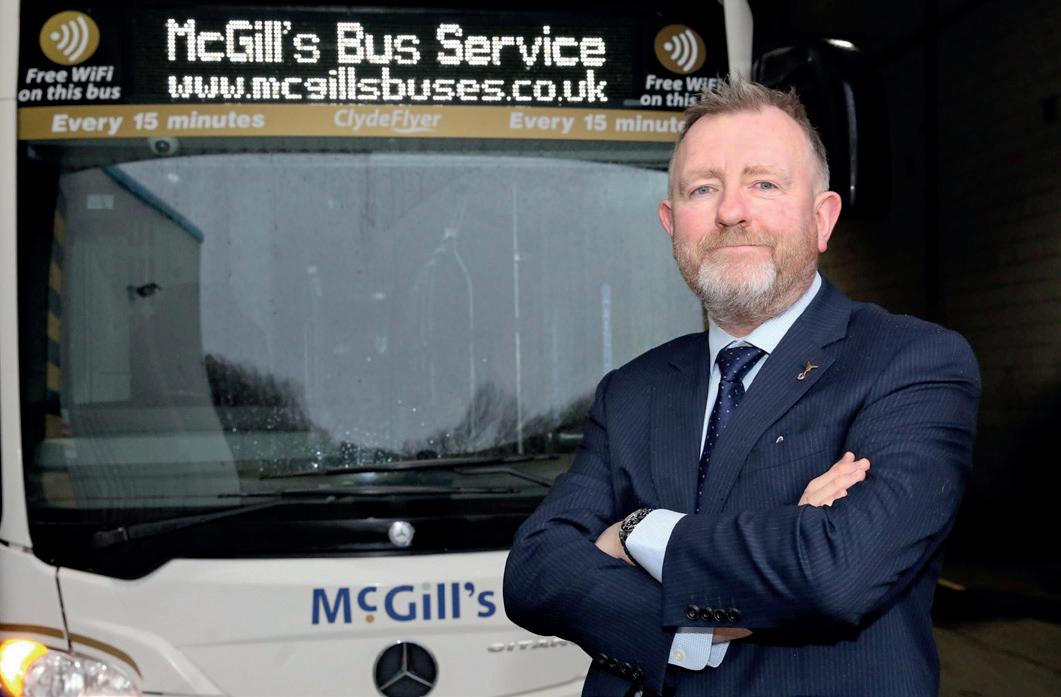
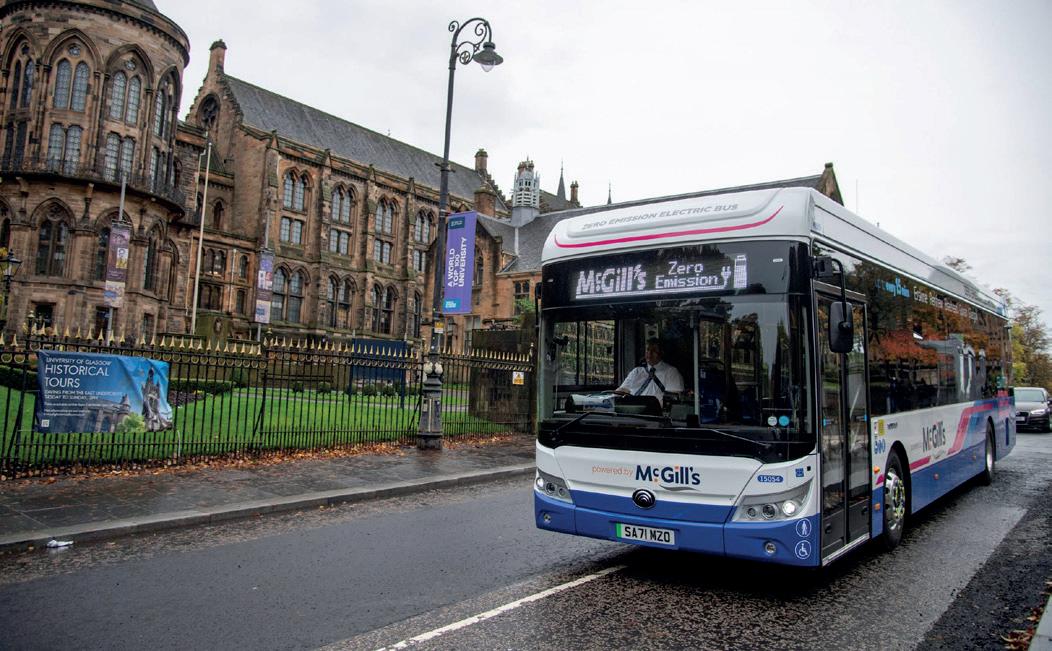
So, is it non-bus users that want franchising? Possibly. It clearly wasn’t bus managers who costed up the current wish list and we know that the majority of quango ofcers aren’t avid bus users so who is it? I believe that we are back at politics. I recently sat in on a local authority meeting where councillors voted through a council budget that meant fewer and more costly public services. In the same meeting they lambasted the local bus company (me) for delivering fewer and more costly bus services and resultantly voted through a motion to (a) franchise bus service via SPT and (b) explore the creation of a municipal bus company to deliver these bus services. No one present seemed to catch the contradiction or apparent similarity in predicament. It is okay for local authorities to have budgetary constraints but not private bus companies it seems. Tat situation was repeated at two other local authorities. Indeed, I had to report three councillors to the ethics and standards body as they lied in their contributions to the debates.
How do we get past all of this madness? If we must turn it into a game, then really, the only game in town is for public bodies to work with bus operators to deliver the best and most afordable bus service possible. Amazingly, that hasn’t really been done to the degree needed in the last 25 years in Strathclyde.
If we are to efect signifcant and lasting change in bus services in Strathclyde, there must be a just transition. A transition that starts with the premise that private companies that have invested heavily and done their best can be put out of business overnight is unjust and unacceptable. Franchising can obviously work, and if that is where we are to go for the next 35-50 year period then we have to fnd a way to transition. Otherwise, all that is going to happen is that investment will dry up to pay for expensive legal challenges and that benefts no one, especially bus users.
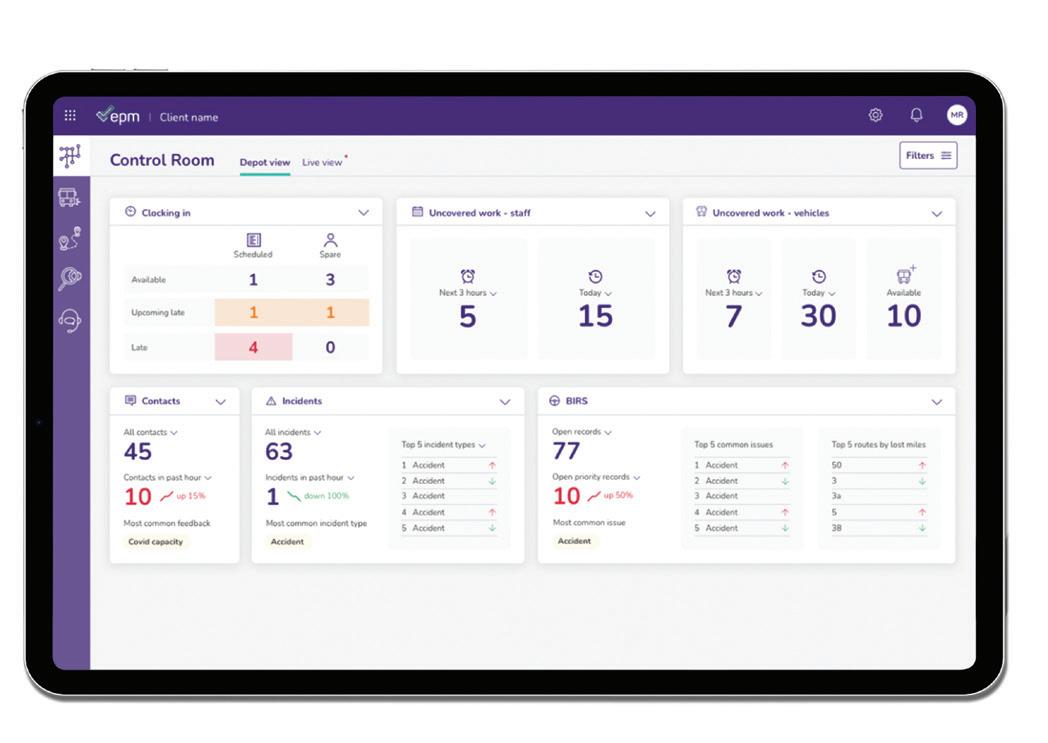

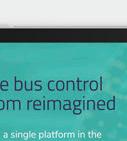






































































































































In the complex world of bus operations, the control room plays a pivotal role. It is the heart of a proftable network, making critical decisions to ensure smooth daily operations. However, with the abundance of technology available to controllers, turning rich data into actionable insights can be challenging. EPM Bus Solutions, a company with a long history of working with major Scottish operators such as Lothian, McGill’s, FirstGroup and Stagecoach, aims to address this challenge and signifcantly impact it with its innovative Control360 product.
Revolutionising operations with Control360
Control360 provides an advanced sofware solution designed to streamline bus operations. Tis platform consolidates operational data from various systems into a single, centralised location, enabling control room teams to manage day-to-day issues efectively. By integrating data from multiple sources, including existing industry-standard sofware and third-party systems, Control360 equips controllers with the context needed to make informed decisions in real time.
“Operators have access to plenty of technology, but what’s missing is a unifed perspective,” explains Nick Brookes, Sofware Director at EPM. “We aim
“Integrating Control360 into control room operations eliminates the need for duplicate data entry”
to provide controllers with a consolidated view that enables efcient, data-driven decisionmaking, ensuring reliable service at an optimal cost. Te potential for efciency gains is signifcant.”
Streamlined operations and enhanced decision-making
Integrating Control360 into control room operations eliminates the need for duplicate data entry. Tis ensures data accuracy and allows for instant updates. Te comprehensive integration includes information on accidents and incidents, customer services, driver and vehicle allocation and engineering (from third-party systems). By consolidating all these elements, Control360 enhances operational efciency and enables efective decision-making. Tis ultimately leads to signifcant cost savings for bus operators.
“Our integrated platform, which combines EPM and Omnibus’s popular sofware solutions, is designed to consolidate operational data automatically,” says Aiden Proctor, Head of Product at EPM. “It provides a clear and comprehensive overview of the entire network by eliminating data silos. Tis interconnected system empowers teams to proactively manage the network and make timely, well-informed decisions, ensuring reliable and high-quality service delivery.”
Key features of Control360 n Efcient duty allocation: Te platform efciently assigns unallocated duties while ensuring legal compliance and minimising costs. Tis is all managed through a single, intuitive screen; n Real-time alerts: Control360 provides real-time alerts that bring attention to driver-related issues, enabling timely action to


Aiden Proctor
“By consolidating information from various sources, operators in the future can harness the power of machine learning to identify the factors affecting service delivery”
avoid potential disruptions; n Streamlined incident management process: record lost mileage incidents and driver allocation impact in a single workfow; and n Predictive network management: Control360 allows control room teams to foresee network issues in advance by analysing trip and timing point
specifcs. Tis proactive approach helps mitigate problems before they impact service.
Building a better bus operation
Integrating Control360 into control room operations improves day-to-day management and provides long-term benefts. By leveraging data from various sources, operators can gain valuable insights that inform strategic decisions and allow them to respond quickly to changing market dynamics.
“Responsiveness and agility are crucial,” Aiden adds. “We ensure that every aspect of bus operations is optimised to meet and exceed passenger expectations. Additionally, our data-driven insights support strategic decisionmaking, allowing operators to stay ahead in a dynamic market.”
Nick takes up this theme: “Tis growing data repository serves as a foundation for future innovation. By consolidating information from various sources, operators in the future can harness the power of machine learning to identify the factors afecting service delivery. For example, understanding the variations in trafc congestion between school term times and holidays enables more precise adjustments and improved service adaptation.”
Fit for the future
EPM Bus Solutions, through their Control360 product, is transforming the control room experience. By ofering a unifed, integrated approach, Control360 enhances operational efciency, supports informed decision-making, and ensures a high-quality, reliable service for passengers. Tis innovative solution aims to empower bus operators to navigate the complexities of modern bus operation with confdence.
Last month we published the frst-year results of the new Your Bus Journey survey in Scotland.
Tis survey builds on the success of Transport Focus’s previous Bus Passenger Survey that ran from 2009 to 2019. It takes a diferent approach, now continuously collecting the experiences of bus passengers in participating areas throughout the year.
We’ve also changed the survey so it’s even more accessible to passengers. We’re asking passengers at both the bus stop and on the bus to participate, and there are more ways they can complete the questionnaire.
Te survey provides a robust, comparable benchmark that can be used by transport authorities, bus operators and governments to identify what really makes a diference to a bus passenger’s journey.
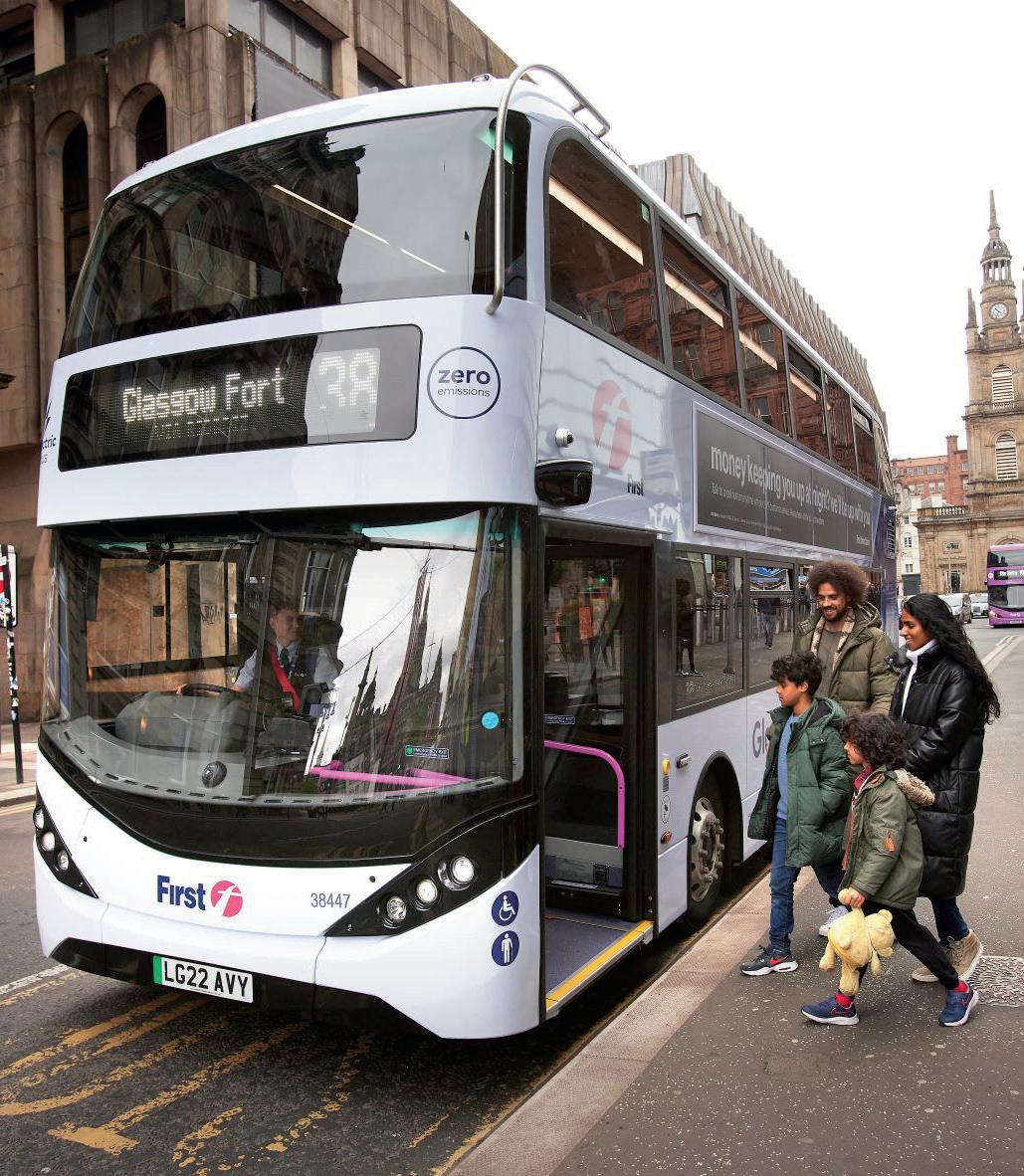
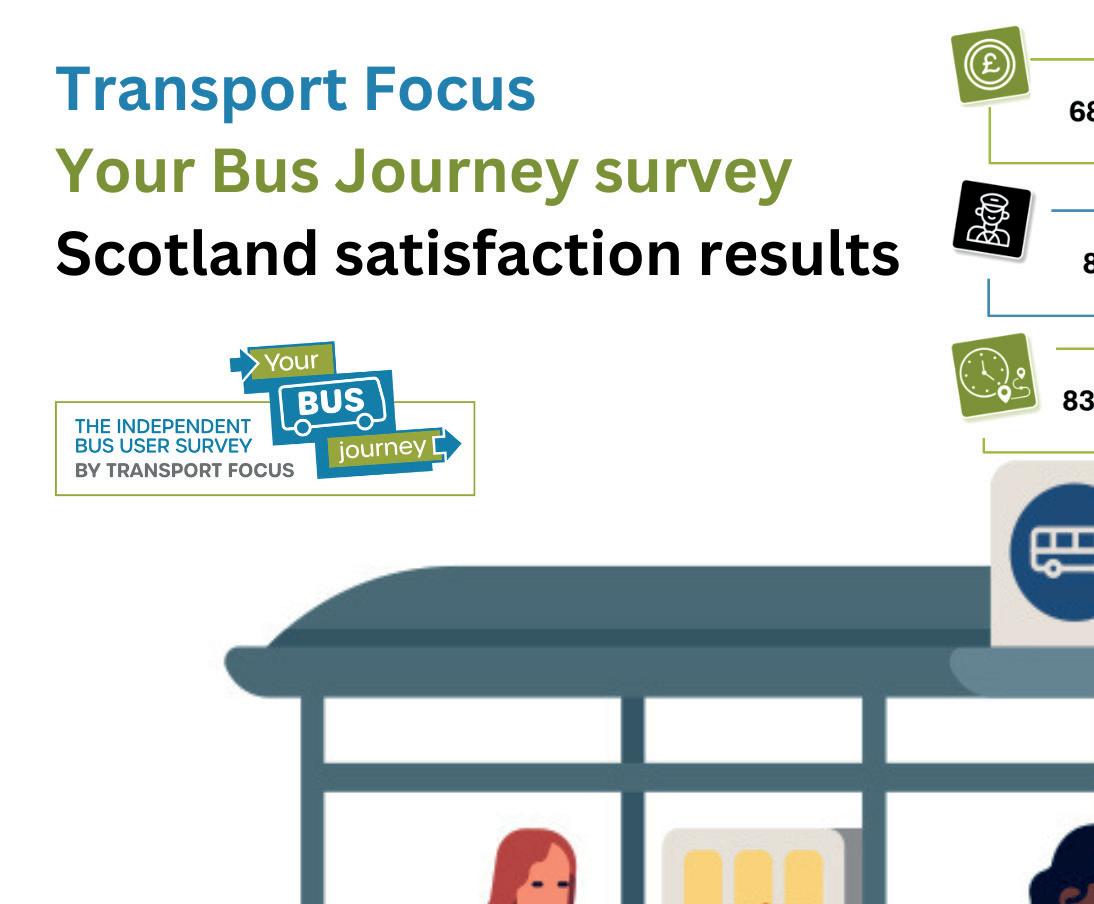



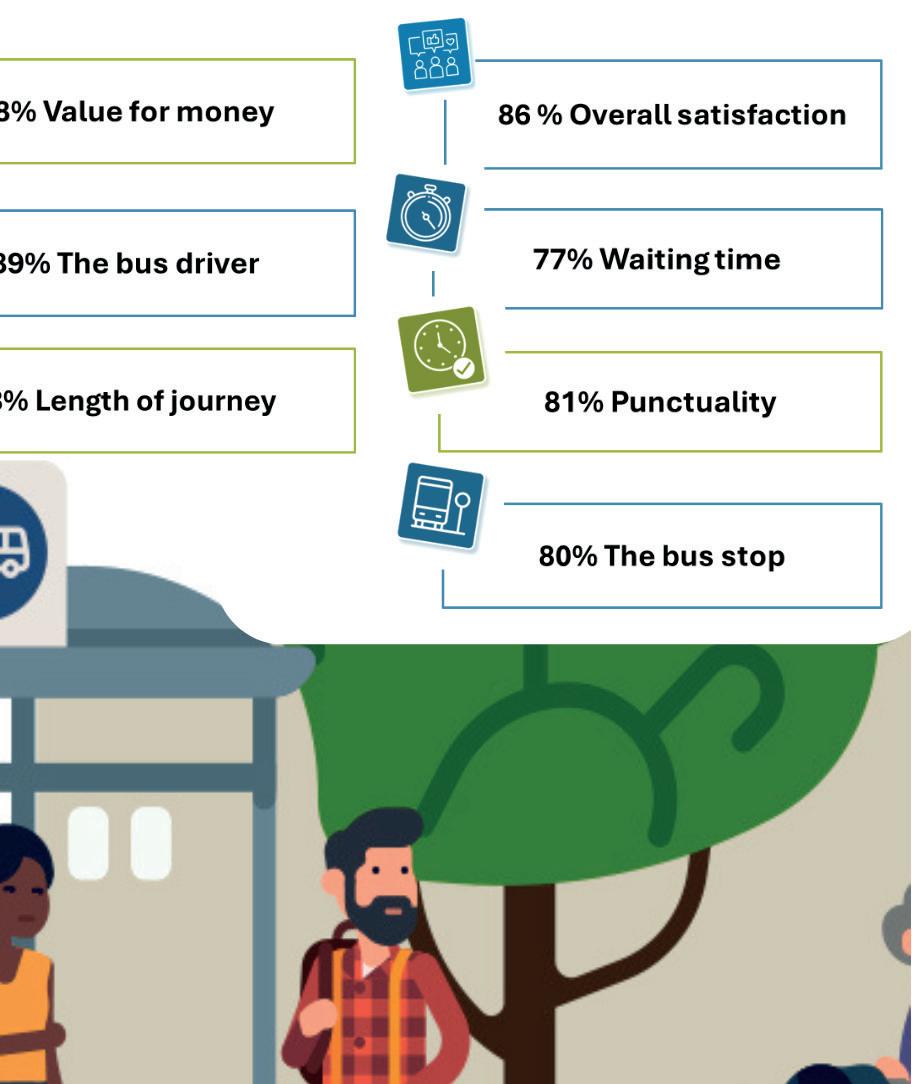

We’re working closely with these organisations to ensure evidence is turned from data to delivery of improvements. Tis enables action plans and investment to make a positive impact for passengers.
Te report presents a summary of the fndings from the frst year of the survey across the Regional Transport Partnership (RTP) areas and operator networks in Scotland. It provides observations on the factors that afect bus passenger satisfaction, such as value for money, the bus stop, waiting times, punctuality, the bus driver and journey times.
More than 300 million passenger journeys were made by bus across Scotland last year. People depend on buses to get them to places of work and education, to important appointments and to give them access to shops and leisure. So, what do passengers think of their journey experience overall?
Scotland-wide overall satisfaction at 86% indicates a reasonable level of satisfaction. Te key drivers of overall satisfaction are:
■ Satisfaction with timeliness (waiting time, punctuality, journey time) is, by a distance, the most important driver of overall journey satisfaction.
■ Value for money plays a secondary role in driving satisfaction, in particular for making fare-paying passengers very satisfed.
■ For those making a free journey, the interaction with, and behaviour of, the bus driver plays the secondary role in generating satisfaction.
Transport challenges difer across regions of Scotland. Te transport barriers facing those living in towns and cities in the Central Belt will not necessarily be the same as those living in towns and cities in other parts of Scotland or, indeed, rural communities.
In addition, diferent areas of the country may have their own transport requirements to meet their inclusive growth objectives. Tese challenges will need a range of solutions and models of governance to deliver them.
Your Bus Journey gives a passenger perspective on
the challenges to be tackled. Importantly, the survey shows there are challenges and that many passengers are still not getting the service they expect. Tis is evidenced in the range of results across the survey on key factors such as overall satisfaction with the journey, value for money and punctuality.
Te diferences are signifcant - ranging from a diference of 9% between the highest and lowest performing areas for overall satisfaction, to a diference of 38% for value for money.
Your Bus Journey also allows Transport Focus to produce Key Driver Analysis reports for each region, using the full 2023 survey results. Tey show how strongly diferent aspects of the journey experience are related to the overall journey satisfaction rating that passengers give, identifying the challenges that matter most to passengers.
Overall, the theme of timeliness makes by far the largest
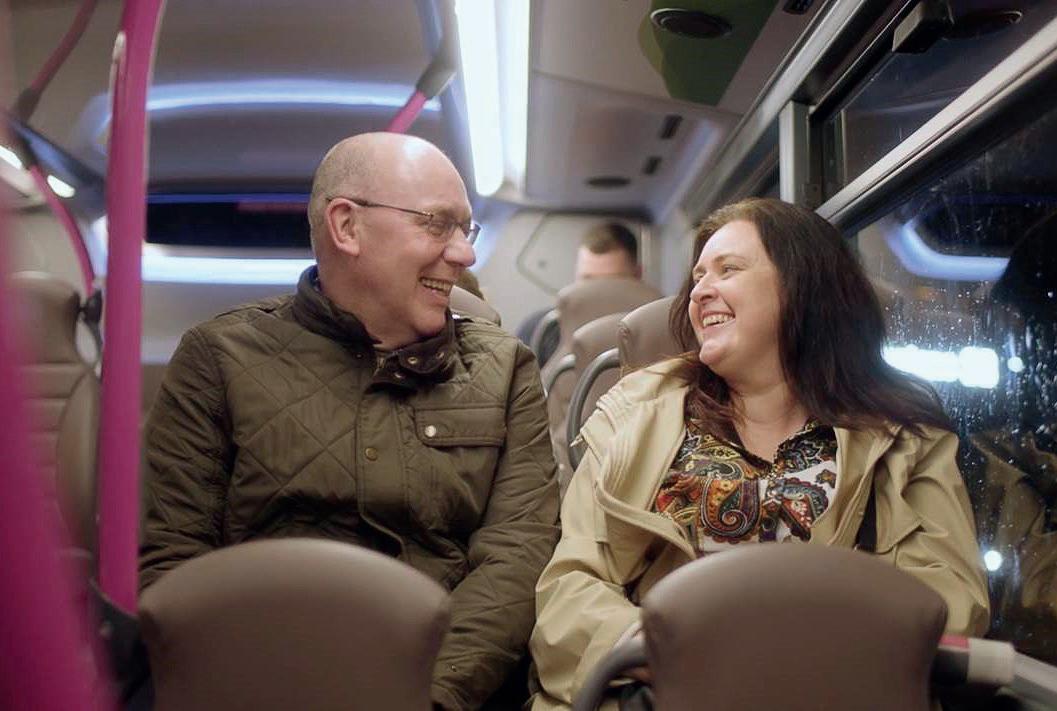
“Satisfaction with timeliness (waiting time, punctuality, journey time) is, by a distance, the most important driver of overall journey satisfaction”

contribution to overall journey satisfaction among both farepayers and free pass holders. Tis theme covers satisfaction with:
■ waiting time;
■ punctuality;
■ the length of time the journey took;
■ the bus stop where the passenger got on, overall.
Focusing on these aspects
of the journey is likely to have the greatest efect in terms of supporting or improving overall passenger satisfaction.
Te importance of the bus driver also shines through, the bus driver can make or break a journey. Overall, satisfaction with bus drivers is fairly high at 89%, including 67% who are very satisfed, and with only 2% who say they are dissatisfed. Comment afer comment references the bus driver’s attitude and demeanour - friendly, pleasant, polite or, occasionally, the opposite.
More importantly, passengers take note of how safe they feel and how careful the driving was. And critically, bus drivers’ actions can help passengers with their own challenges and even turn a difcult journey into an enjoyable one.
We hope that Your Bus Journey survey has established a new benchmark for bus passenger satisfaction in Scotland and can help all transport partners in meeting the challenges ahead.

The new Volvo B8R - MCV eVoTor is an attractively priced full-size coach, offering superior fuel efficiency and proven reliability.
Initially launched with 53 seats, this new fully seated 12.6m model retains the same superior level of passenger comfort you’d expect from a Volvo.
Simply put, a workhorse and a profit centre for your business.
Volvo Bus UK & Ireland www.volvobuses.com/gb/




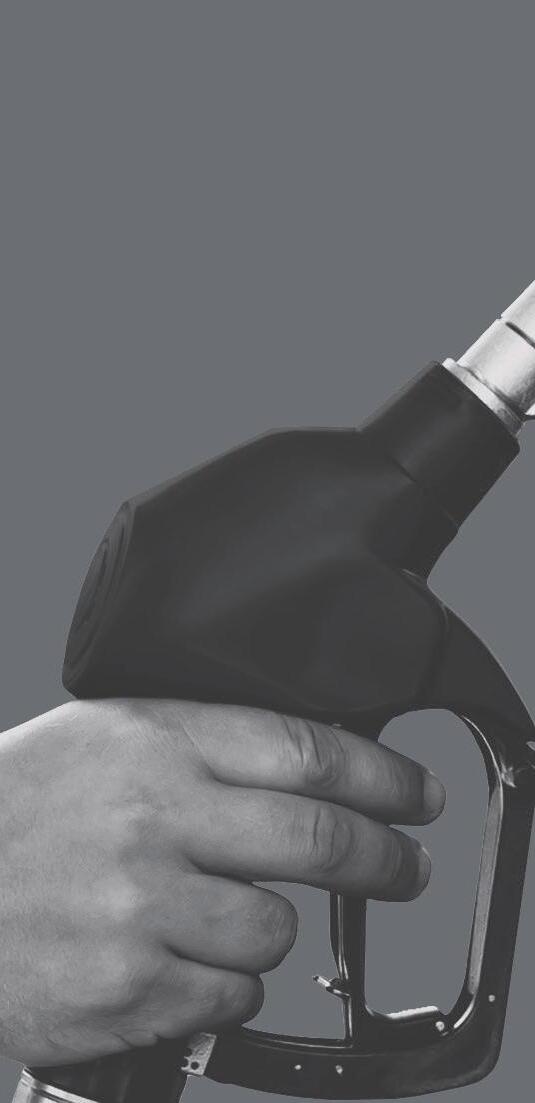

No matter how your business purchases fuel, you can fix your diesel price for up to 12 months.
Know what every litre will cost. Budget with confidence.

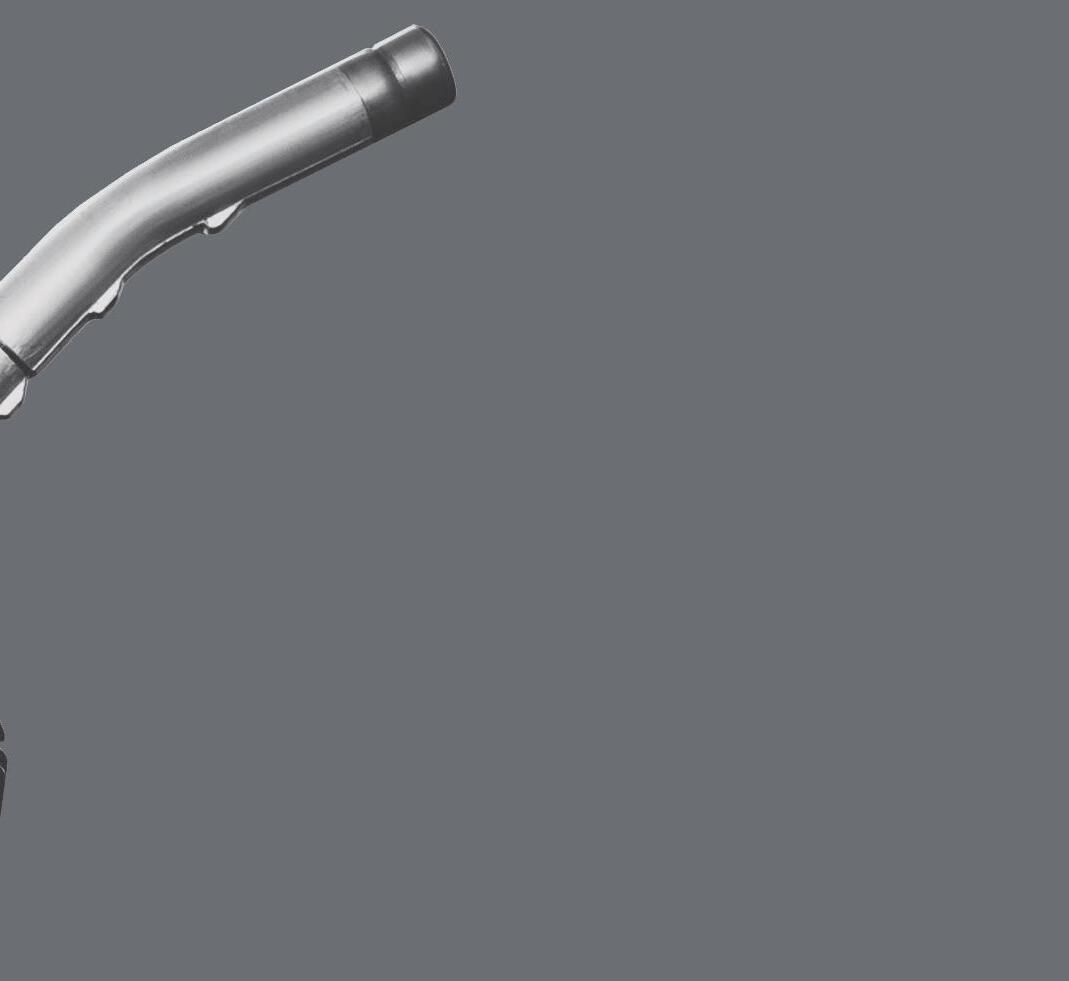















46th Annual CPT Conference
September 9-10, 2024












Thank you for joining us at the 46th annual CPT Scotland Conference.
We are delighted to be returning to the Glasgow Hilton Hotel afer the success of last year’s event. Te Hilton provides us with excellent transport links, better accessibility, and allows us to ofer greater exhibition space to our sponsors and partners. Maybe most critically, the dinner was lovely last year too!
We are also delighted to have the Beatson Cancer Charity as our Charity partner once again. Te Beatson does such amazing work, supporting cancer patients and their families. Last year, through your generosity, we managed to raise over £3,000 which will go on funding specialists, research and education to fght cancer and care for cancer patients.
As per last year, we hope to welcome more of our public sector partners to conference, opening up our business sessions to a wider spectrum of views. Troughout the two days we shall be discussing issues that are largely or wholly reliant on the actions of local and national government. It is important that their voices are part of the debate.
Tis year’s title is Getting Priorities Right. A title that is applicable to several aspects of bus and coach.
Most literally, bus priority is critical to our shared ambition to improve bus services. Priority can free bus from the congestion that chokes our towns and cities, improve punctuality, reliability and running times, and reduce emissions and operating costs.
Te £500m Bus Partnership Fund (BPF), launched in 2019 recognised this. Designed to
and how do we facilitate their delivery?
Priority is very apt for our coach members too. Coach is a critical part of Scotland’s sustainable tourism ofering. Coach tourism spend supports attractions and destinations across the country and yet access, parking, and facilities for coach are ofen an aferthought. What needs to be done to ensure coach tourism is welcomed and catered for to make Scotland more Coach Friendly?
Finally, how do we ensure bus and coach are a priority for Scottish Government within the current fnancial environment?
Within the past few weeks, the government has made some politically difcult but fnancially necessary decisions. Ending universal pensioner winter fuel payments, the peak rail fares pilot, and the proposed free bus travel for asylum seekers. With money so scarce, what case can we make for decision makers to prioritise our sector?
Over the following two days we have secured some outstanding speakers to address these questions and more, including how we improve partnership working, the future of smart and integrated ticketing, what next for decarbonisation, and are how we ensure that the passenger is a priority in all we do.
fund bus priority infrastructure improvements and foster greater partnership working, the BPF was the catalyst for a number of ambitious bids from Scottish local authorities working in partnership with operators. However, it has now been ‘paused’ with only around £27m of its £500m budget allocated to date. How do we get bus priority back on the government agenda?
What aspects of bus service improvement should be prioritised? Does the government want operators to prioritise investment in zero-emission vehicles for its decarbonisation agenda, grow rural networks to improve social accessibility, or cap fares to tackle the cost-ofliving crisis? We cannot commit to increased operational costs alongside reduced commercial revenue. What are the government’s policy priorities
Given the key role bus and coach have as the backbone to Scotland’s transport network, we should be a priority for government. I look forward to spending conference with you, discussing how we ensure we get our priorities right.
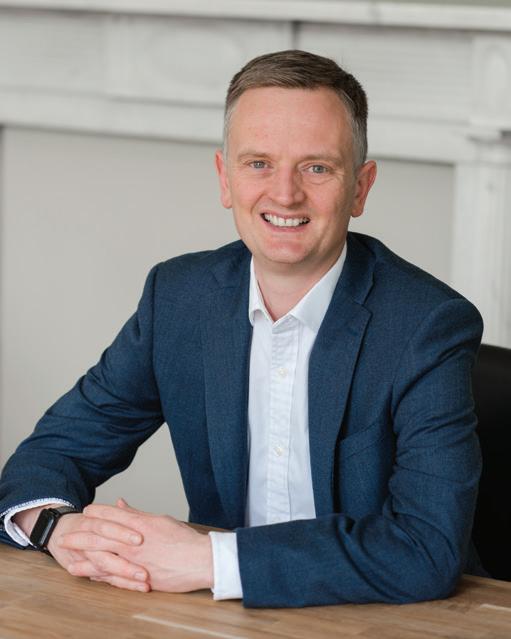

As the inventors of safety fooring, here at Altro we pride ourselves on being able to create safe environments for a variety of areas, and transport is no diferent. We’ve been keeping bus and rail passengers safe for decades on both public and private transport. With a range of solutions and accessories, you have everything you need to create a wow factor and deliver a great customer experience without compromising on safety, design or durability.
■ altro.com/uk


Just as the bagpipes are iconic for Scotland, Backhouse Jones is equally synonymous with legal advice to the transport industry - and we trust as distinctive. Backhouse Jones is uniquely industry-specifc, which explains why we advise most of the major operators in the UK in addition to many family-owned enterprises.
■ backhousejones.co.uk

A cancer diagnosis is a traumatic and life-changing event, not just for the patient, but also for their family. Beatson Cancer Charity (charity partner of the CPT Scotland Conference) provides a comprehensive range of wellbeing and specialist services including complementary therapies, specialist health and work support and specialist activities delivered by charity staf and volunteers.
■ beatsoncancercharity.org

Bus Users UK champions passengers’ rights and campaigns for inclusive, accessible transport. As the only approved Alternative Dispute Resolution Body for the bus and coach industry, we handle complaints under Passenger Rights Legislation and ensure transport providers meet their responsibilities. We’re part of the Sustainable Transport Alliance, a group dedicated to promoting the benefts of public, shared and active travel. As well as handling complaints, our Bus Compliance Ofcers carry out regular checks to ensure transport providers fully meet their responsibilities and we make sure local communities are at the heart of transport planning and delivery across Scotland.
■ bususers.org

Cummins is a leading provider of power solutions for bus and coach applications in Europe, with over 40,000 Euro VI-powered buses and coaches. Cummins’s range of solutions covers everything from compact midi-buses to three-axle double-deckers and articulated buses, ofering power technologies such as diesel, natural gas, hydrogen, and battery-electric options. With four master service centres and over 40 highly qualifed technicians, Cummins is committed to providing high-quality products and services that maximise uptime, minimise emissions, and deliver top performance throughout the entire lifecycle of your vehicle. ■ cummins.com


In today’s rapidly changing environment, operators need to respond quickly and efectively to evolving demands in order to maximise revenue growth and enhance operational efciency. Our solutions are designed to meet the specifc needs of passenger transport operators by leveraging cuttingedge technology and specialist consultancy services. With our end-to-end solutions covering operations ‘before the day,’ ‘on the day,’ and ‘afer the day,’ we provide a pathway to enhancing revenue, increasing patronage, and improving overall efciency for passenger transport operators. ■ www.omnibus-epm.solutions

FAIRTIQ is an innovative mobile ticketing system that makes travelling on public transport easier than ever before. Te app allows users to easily checkin and check-out rather than buying a ticket from the driver or at a TVM. At the end of their journey, users are charged the lowest possible price for the actual journey undertaken - whether it is single or multi-leg, or involving more than one operator. Because of low upfront costs, and high customer satisfaction, FAIRTIQ’s app ofers the perfect solution for all transport companies regardless of size or type. Te app uses artifcial intelligence-based bespoke algorithms drawing on many years of experience in public transport and ticketing to build a highly accurate picture of a user’s journey, making the app very accurate and reliable.
Available on Apple iOS and all Android versions, FAIRTIQ’s app can be brought into operation quickly and with minimal disruption, as no on-vehicle or on-station equipment is required. ■ fairtiq.com

Pelican Bus & Coach is the sole UK and Ireland importer and distributor for Yutong Buses and Coaches. It is wholly owned by Pelican Engineering Co. Ltd which was frst established in 1919 and is the oldest commercial vehicle dealership business in the UK. Pelican also operates two truck dealerships in Yorkshire. ■ pelicanyutong.co.uk



Ticketer is an innovator in transit, helping operators ofer seamless passenger experiences and deliver operational excellence. As a trusted technology partner, Ticketer provides a suite of solutions, ofering a ticketing platform, data and analytics hub, and advanced feet management tools. Ticketer’s mission is simple. It helps operators to operate. ■ ticketer.com

Volvo Bus UK and Ireland is a leading provider of innovative and sustainable public transport solutions. With a strong commitment to safety and environmental responsibility, we ofer a range of reliable buses and services designed to enhance urban mobility and reduce carbon footprint. ■ volvobuses.com/gb
JOAN AITKEN

Joan, a solicitor by profession, is best known in the bus industry for her role as Trafc Commissioner for Scotland from 2003 to 2019. From November 2020 to March 2024, she served as the independent Chair of the Glasgow City Region Bus Partnership Steering Group. A recently appointed Trustee of Bus Users UK, she also chairs the Board of Trustees for Transaid. In 2019, she was awarded an OBE for her contributions to transport and road safety in Scotland.
KEITH BRADBURY

Keith co-founded Ember, a company focused on developing fully electric and tech-enabled intercity transport. Te company operates highmileage electric vehicles on some of the most challenging routes. Keith is a deep generalist with a practical approach to problemsolving. Away from Ember, he enjoys rock climbing and is keen to go once day visit space.
STEVE BROADEY

Steve has been working in UK and European Public Transport since 2005. Most of this time has been spent on digital innovations in engineering, operations, customer experience, ticketing, autonomous shuttles and demand-responsive transport. Steve leads FAIRTIQ’s activities in the UK, Norway and Ireland.
KIRSTY CHALMERS
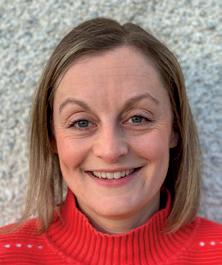
Kirsty Chalmers is Programme Manager for the Bus Partnership Fund at Aberdeen City Council, leading the Aberdeen Rapid Transit project. Kirsty has a long history of partnership working through the North East Bus Alliance and, alongside colleagues at Aberdeenshire Council, is leading work to develop a BSIP Agreement on behalf of the Alliance.
MARTIN DEAN
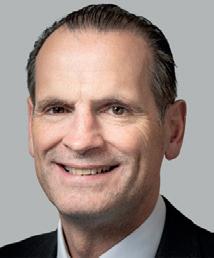
Martin oversees the performance of Go-Ahead’s UK bus companies outside London, covering areas from Devon and Cornwall to the northeast of England. With over 30 years of transport experience, he was previously Go-Ahead’s Head of Business Development. He also serves as Non-Executive Chairman of Edinburgh Trams.
FIONA DOHERTY

Fiona is the Managing Director of Stagecoach West Scotland and the UK Service Centre in Perth, bringing over 30 years of executive experience. Passionate about fostering customer-oriented cultures, Fiona holds several key roles, including Chair of the Glasgow Bus Alliance and Chair of Scotland’s Confederation of Passenger Transport. She is a Fellow of the Chartered Institute of Transport and Logistics.
ALISON EDWARDS

Alison Edwards is Director of Policy at CPT, the trade association for the bus and coach sector in the UK. Alison joined CPT in May 2019 afer over a decade in the Civil Service.
DAVID HAAS

David, a solicitor qualifed in Scotland, England, and Wales, has worked for Highland Council since 1996. In his current role since 2007, he is responsible for community empowerment, supporting Councillors, and leading city and area projects.
PAUL LYNCH

Paul is Managing Director of Stagecoach London. He has 40 years of experience in the bus industry and joined Stagecoach in 1994 afer the privatisation of London Buses. He also serves as the current President of the Confederation of Passenger Transport.
MORAY MACDONALD

Moray has over 25 years of experience in public afairs and PR, including roles as a senior political adviser in Scotland and New Zealand. He led content production for Weber Shandwick across EMEA and served as Managing Director in Scotland.
JAMIE ROSS
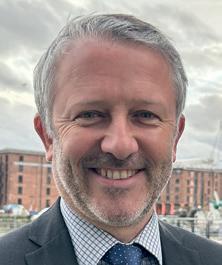
Jamie is Director of Transport at the Liverpool City Region Combined Authority. He has worked in senior leadership roles across multiple sectors within the transport industry, including a spell at the Scottish Government before setting up of Transport Scotland.
DR ANDREW SEEDHOUSE

Andrew has nearly 30 years of experience in public transport. He founded Traveline SW England, led smart ticketing at FirstGroup and established Smart Applications Management (SAM) in 2010. Andrew is also the independent Chairman of Scotland’s National Smart Ticketing Advisory Board.
PETE SMITH

Pete Smith is an experienced Operations Manager at Radical Travel Tours.
Committed to sustainable tourism, Pete has played a pivotal role in integrating eco-friendly practices into the company’s operations.
PHIL SMITH

Phil has over 40 years of experience in the coach and bus industry. Since 2021, Phil has been CPT’s UK Coach Manager and has led the organisation on key issues afecting its coach members.
JAMES SPENCER
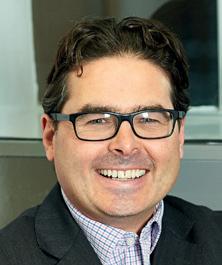
James Spencer is the Managing Director of fuel specialist Portland. His company ofers fuel hedging, advisory services, fxed-price fuel deliveries and AdBlue® supply. James is a regular contributor to fuel-related debates in the media.
PAUL WALKER
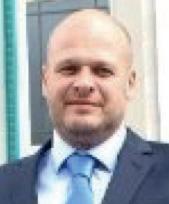
Paul is Head of Transport at Portsmouth City Council, leading a team delivering the £48m Bus Service Improvement Plan. Paul has almost 30 years of experience working in the south of England for district, county and unitary authorities, including a spell as Head of Highways and Transport at Southampton City Council and a large, multi-awardwinning bus operator.
RONA WALLACE

Rona has extensive experience in marketing and tourism across the UK and New Zealand, with roles in airlines, tour operators, and visitor attractions. She led the creation of a Destination Marketing Organisation in New Zealand, boosting regional tourism. With experience at VisitScotland, she excels in consumer and B2B marketing. Rona works on partnerships and growth in Scotland’s tourism sector, focusing on responsible tourism.
GERARD WHELAN

Gerard is a Director on KPMG’s market-leading transport advisory team. He works closely with the government, bus operators, and CPT to support the development of public policy and commercial strategy on local buses and to provide credible evidence on the costs and benefts of investment in bus fares and services.
PAUL WHITE

As well as Director of CPT Scotland, Paul is a non-councillor Board Member of SESTRAN and a previous Chair of the Scottish Transport Studies Group. Paul has worked in transport policy for almost 20 years across Scotland, Westminster and Brussels.
MON 9TH SEP
1200-1300
Networking Lunch and Registration:
1310-1400
Prioritising Partnership
Last year’s Conference theme was Progress through Partnership, however just two months later the Bus Partnership Fund was paused. Tis session will revisit partnership, looking at best practice and what we can do to improve partnership working.
Paul Walker: National Bus Strategy Delivery Manager, Portsmouth Council
Fiona Doherty: Managing Director, Stagecoach West Scotland & CPT Scotland Chair
Kirsty Chalmers: Programme Manager for the Bus Partnership Fund, Aberdeen City Council
1400-1440
Prioritising Integration
While not a new idea in Scotland, integrated public transport has been back in the spotlight following the publication of the long-awaited Fair Fares Review in March. So what are the next steps? evolution or revolution?
Steve Broadley: Lead - UK, Norway and Ireland, FAIRTIQ Dr Andrew Seedhouse: Chairperson, NSTAB
1510-1550
Prioritising Sustainability
Coach travel can be a key element of sustainable tourism. How do we help grow this in Scotland?
Phil Smith: Coaching Manager, CPT
David Haas: Ward Manager, Inverness City, Highland Council
Pete Smith: Operations Manager, Radical Travel
Rona Wallace: Senior Manager, Business Growth & Development, Intermediary Marketing, VisitScotland
1550-1615
Prioritising Markets
Te past fve years have highlighted how much geo-political events can impact the sector from the pandemic and global cost of living crisis to the invasion of Ukraine and the confict in Gaza. With increasing uncertainty in the world it has never been more important to look at the big picture when considering how Scotland’s feet will be powered in the coming years.
James Spencer: Managing Director, Portland Fuel
1615-1655
Prioritising Choice
Following on from the previous session on factors impacting fuel/electric markets, the panel will discuss the variety of options available to operators, including their limitations.
Alison Edwards: Policy and External Relations Director, CPT
James Spencer: MD, Portland Fuel
Keith Bradbury: Co-founder, Ember
Martin Dean: Managing Director, UK Regional Bus, Go-Ahead Group
1900-2300
Conference Dinner
Drinks Reception: 1900-1945
Black-tie Dinner: 2000-2300
TUES 10TH SEP
0900-0930 Registration
0945-1015
Prioritising Policy
Te Minister for Agriculture and Connectivity, Jim Fairlie MSP, will speak about the Scottish Government’s approach to bus and coach.
1015-1100
Prioritising Evidence
Tis session will present the results of recent CPT research and what it means.
Gerard Whelan: Director, KPMG
1130-1200
Prioritising Politics
With the UK General Election behind us and a Scottish Election on the way, how does a Labour Government impact transport policy in Scotland?
Moray MacDonald: MD, Instinctif Partners
1200-1250
Prioritising Passengers
Franchising continues to dominate public transport discussions, and was the main focus of Labour’s manifesto commitments in relation to bus. As things progress across the UK the panel will give insight on the varying approaches being taken.
Paul White: Director, CPT Scotland
Paul Lynch: Managing Director, Stagecoach London & CPT President
Jamie Ross: Director of Transport, Liverpool City Region Combined Authority
Joan Aitken OBE: bus user
1300-1400
Networking Lunch



























































